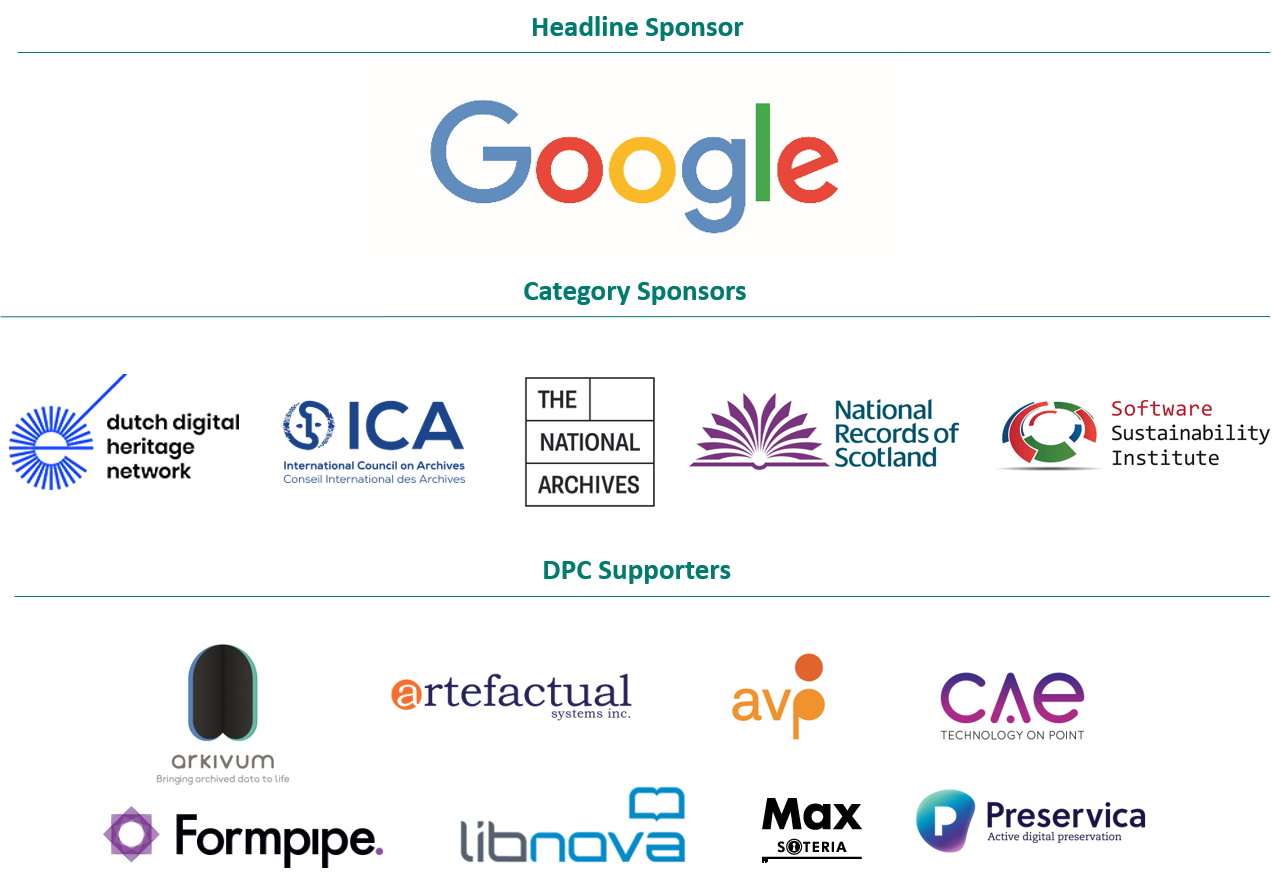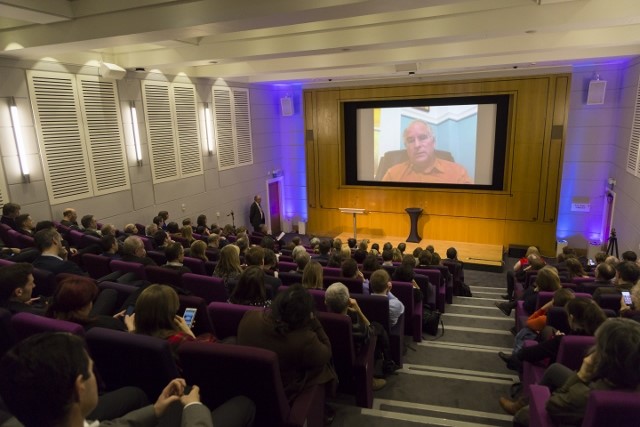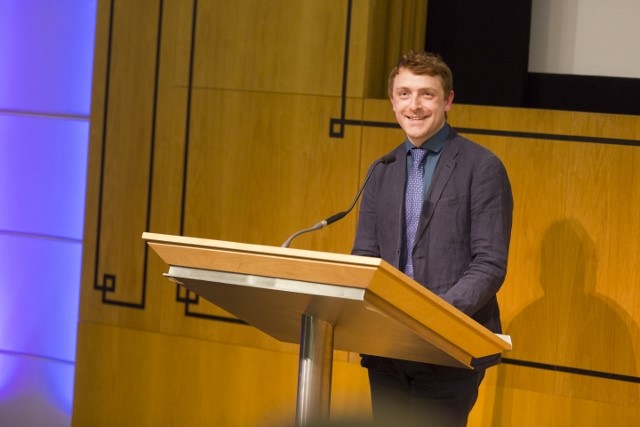Digital Preservation Awards 2024
Watch the Ceremony
In an exciting finale to the Digital Preservation Awards 2024, organisations and practitioners of digital preservation from around the world gathered together for a glittering presentation ceremony on Monday 16th September 2024, at the iPRES 2024 conference in Ghent, Belgium! Watch the ceremony now:
See photos from the awards ceremony
Meet the Winners
Collaborative models of care: preserving Australian First Nations digital cultural heritage
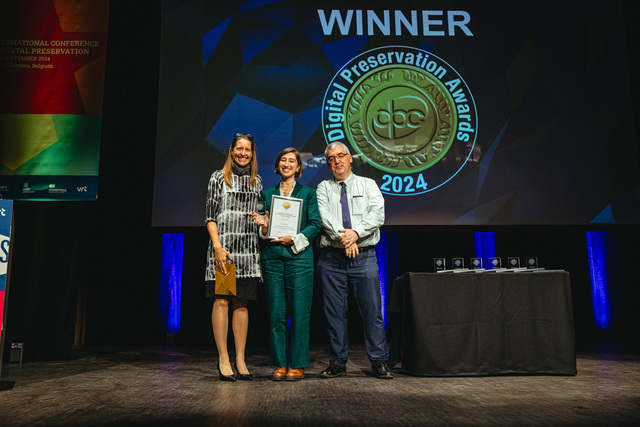 |
2024 Winner of the International Council on Archives Award for Collaboration and Cooperation
|
Improving access to and sustainability of the Pacific and Regional Archive for Digital Sources in Endangered Cultures (PARADISEC)
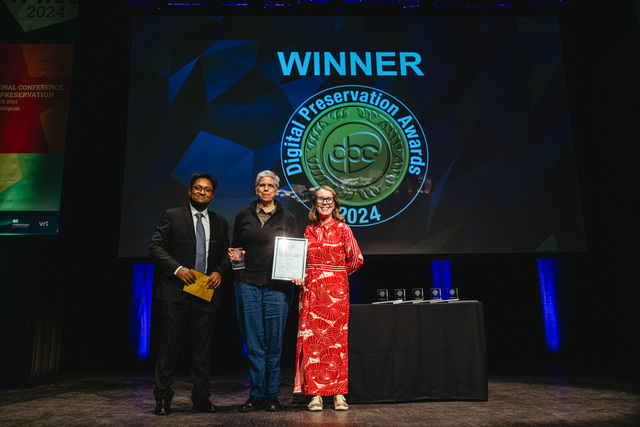 |
2024 Winner of the Digital Repository of Ireland (DRI) Award for Research and Innovation
|
Study group Bits and Bots for building digital skills
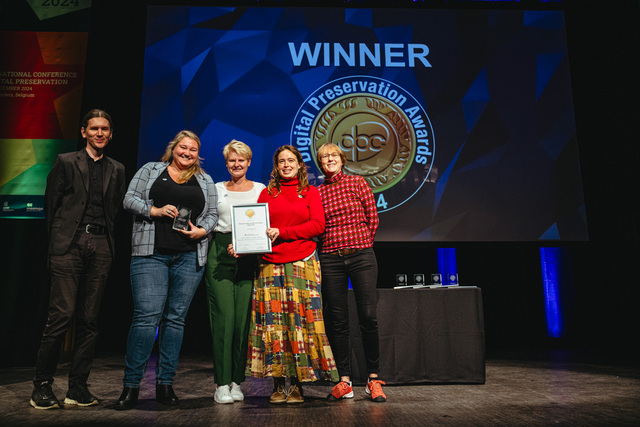 |
2024 Winner of the Dutch Digital Heritage Network Award for Teaching and Communications
Bits and Bots is a study group teaching digital archivists coding skills, currently focussing on Python and front-end development. The group is open to all and everyone, including the organisers, are learning together as a community instead of in isolation. Digital skills are increasingly important to digital preservation and it is not surprising that “Computer Programming” is listed as one of the skill elements in the Digital Preservation Coalition’s Framework. Coding can be daunting, Bits and Bots tackles this challenge, making learning fun by teaching coding through the creation of games. The community consists of 47 members from 5 continents.
|
Claudia Muñoz with Preservación de documentos digitales: el caso de Wikimedia México / Preservation of digital records: the case of Wikimedia Mexico
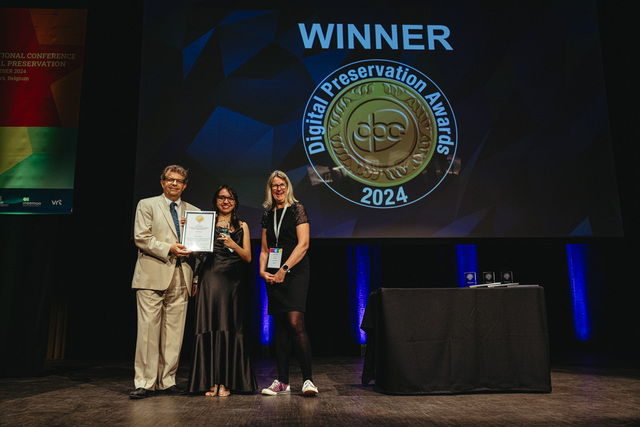 |
2024 Winner of the CLOCKSS Award for the Most Distinguished Student Work in Digital Preservation
|
NHS research records: Reducing Risk
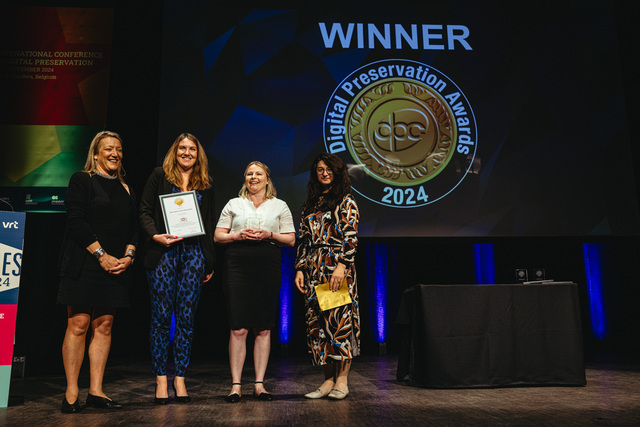 |
2024 Winner of the Research Data Alliance Award for the Most Outstanding Digital Preservation Initiative in Commerce, Industry and the Third Sector
|
DDLD – Living Archive
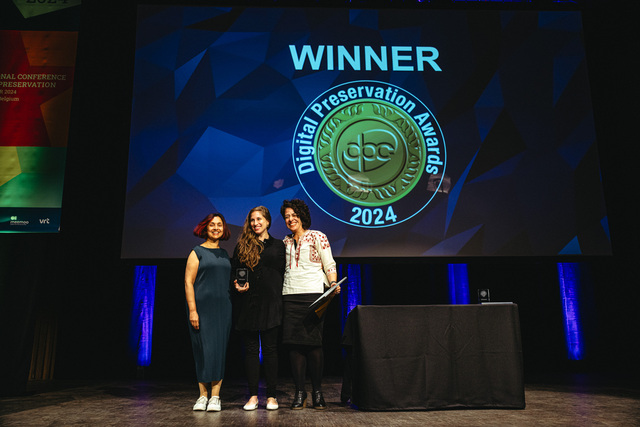 |
2024 winner of the Award for Safeguarding the Digital Legacy
|
Gladys Kemboi
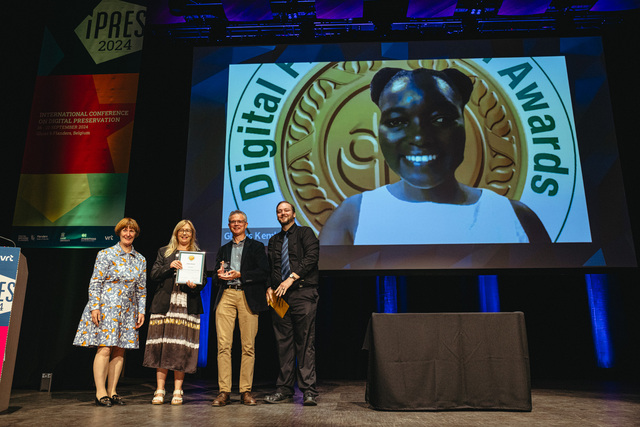 |
20244 Winner of the DPC Fellowship Award
|
Find out more about all of the Digital Preservation Awards 2024 Finalists
|
ICA Award for Collaboration and Co-operation:
|
Digital Repository of Ireland Award for Research and Innovation:
|
|
|
|
||
|
Dutch Digital Heritage Network Award for Teaching and Communications:
|
The National Archives (UK) Award for the Most Distinguished Student Work:
|
|
|
|
|
|
|
The National Archives (UK) Award for Safeguarding the Digital Legacy:
|
RDA Award for the Most Outstanding Digital Preservation Initiative in Commerce, Industry and the Third sector:
|
|
|
|
|
The DPC would like to thank our international panel of judges and all sponsors for their continued support in ensuring the Digital Preservation Awards can continue to recognise and celebrate achievements in the field of digital preservation.
|
Matthew Burgess State Library of New South Wales |
Hilary Hanahoe, |
April Miller World Bank Group |
Marjolein Steeman Netwerk Digitaal Erfgoed / |
|
Gustavo Castener Marquardt International Council on Archives |
Haliza Jailani National Library Board Singapore |
Jenny Mitcham DPC |
Nathan Tallman Academic Preservation Trust |
|
Fatima Darries University of South Africa (UNISA) |
William Kilbride DPC |
Jo Ana Morfin Memórica - |
Melissa Terras University of Edinburgh |
|
Mihaiela Donisa Bank for International Settlements |
Nicola Laurent Australian Society of Archivists |
Sonia Ranade The National Archives UK |
Heather Tompkins Library and Archives Canada / |
|
Lisa Griffith Digital Repository of Ireland (DRI) |
Thomas Ledoux Bibliothèque nationale |
Arif Shaon Qatar National Library |
Jessica Venlet National Digital Stewardship Alliance / |
|
Gali Halevi CLOCKSS |
Roxana Maurer Bibliothèque Nationale |
Barbara Sierman |
Jaye Weatherburn University of Melbourne |
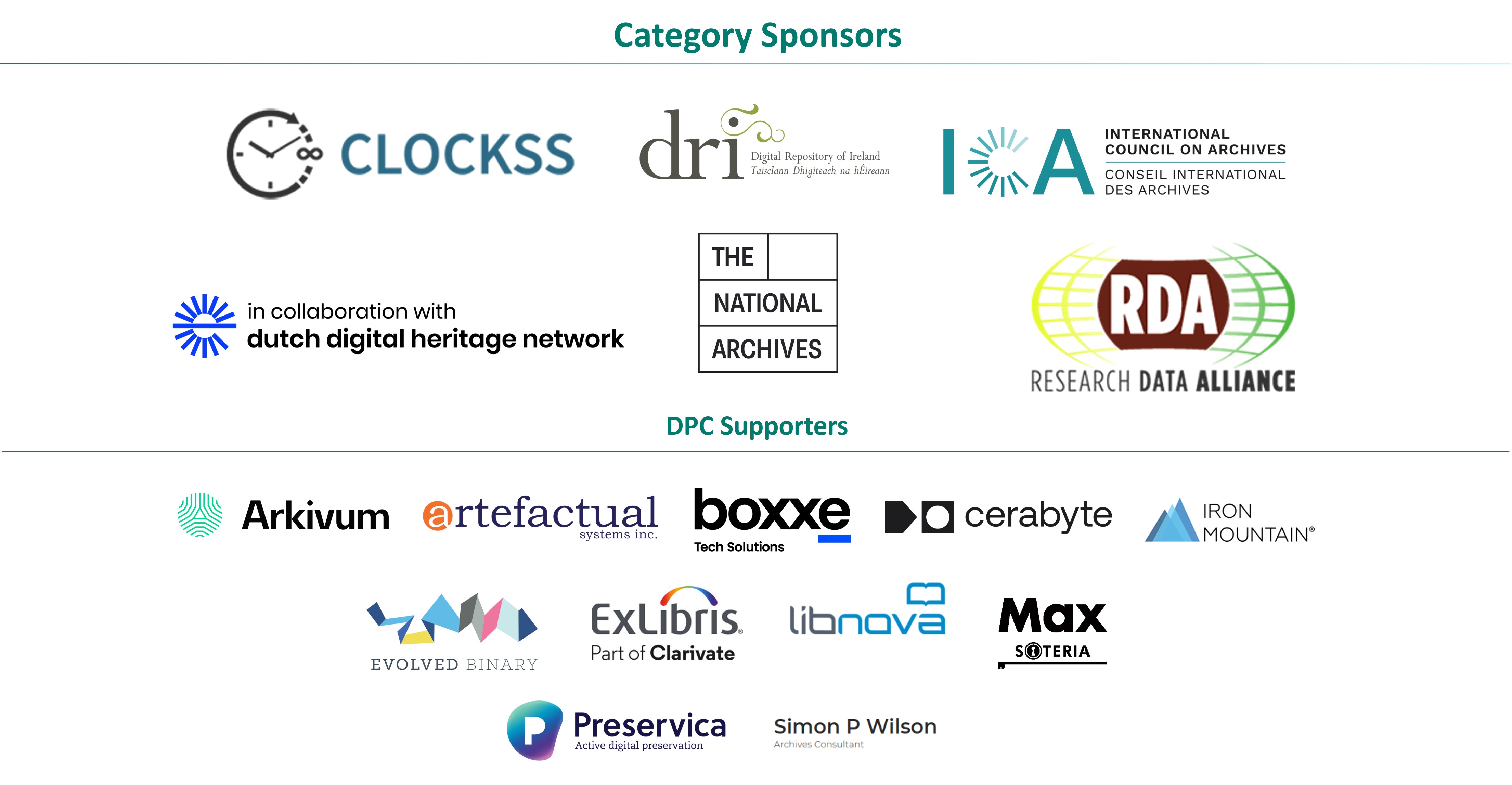
Digital Preservation Awards 2022
Watch the Ceremony
In an exciting finale to the Digital Preservation Awards 2022, organisations and practitioners of digital preservation from around the world gathered together for a glittering presentation ceremony on Monday 12th September 2022, at the iPres 2022 conference! Watch the ceremony now:
Meet the Winners
ARCHIVER Project
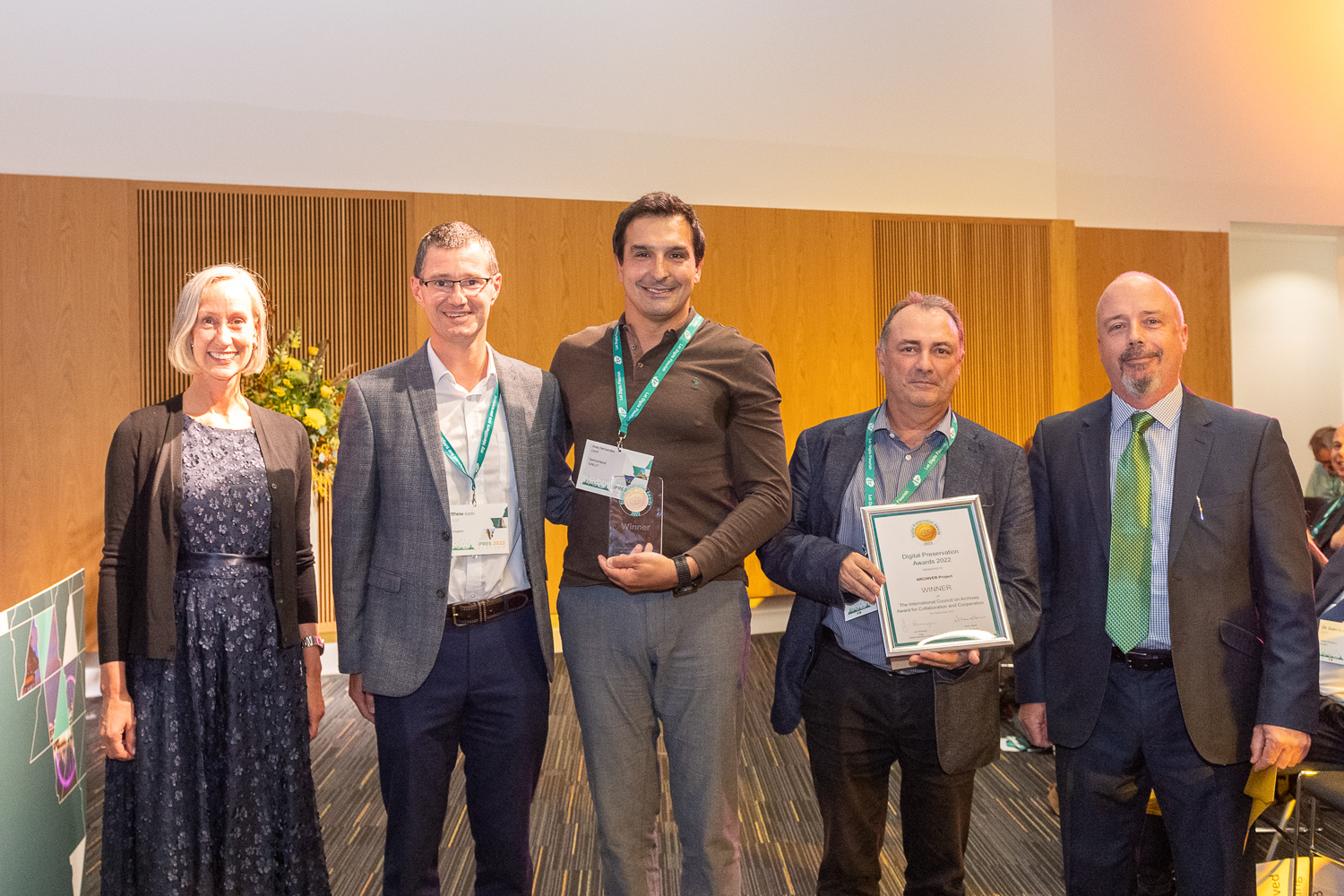 |
2022 Winner of the International Council on Archives Award for Collaboration and Cooperation
|
The effective preservation of archaeological virtual reconstructions
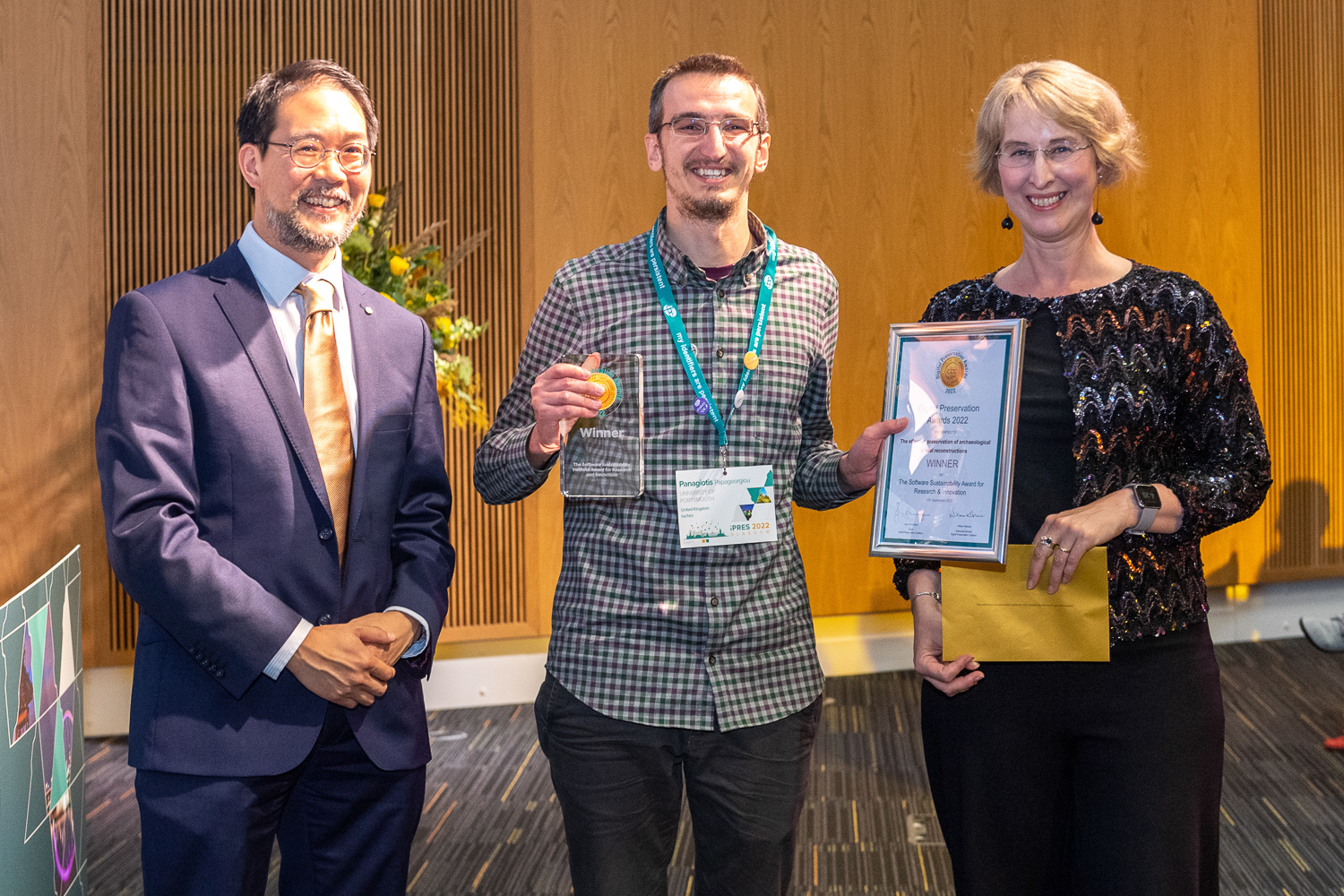 |
2022 Winner of the Software Sustainability Institute (SSI) Award for Research and Innovation
|
Learning through doing: building digital preservation skills in Wales
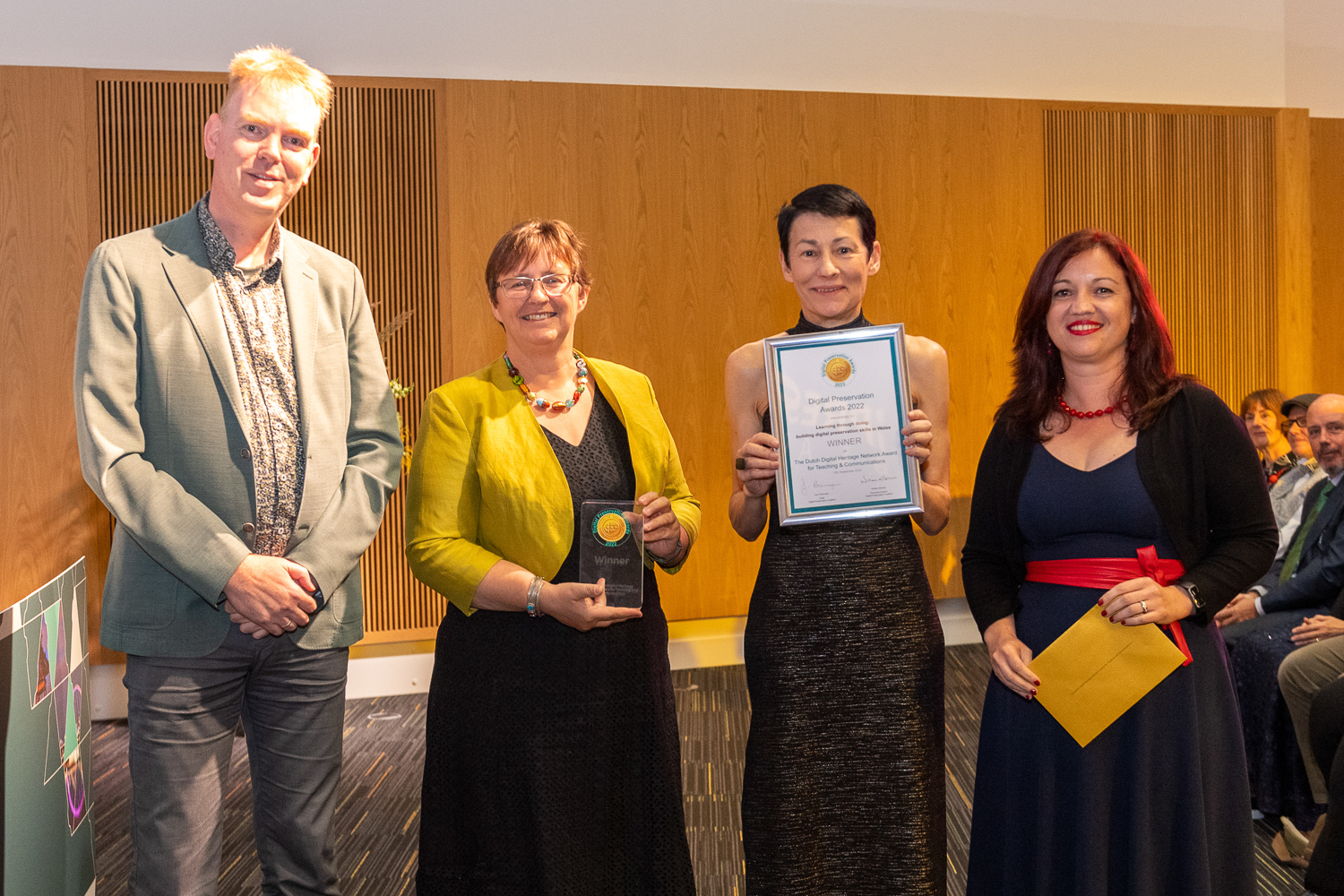 |
2022 Winner of the Dutch Digital Heritage Network Award for Teaching and Communications
|
sasha arden with 'Access to Artistic Content on CD-ROMs'
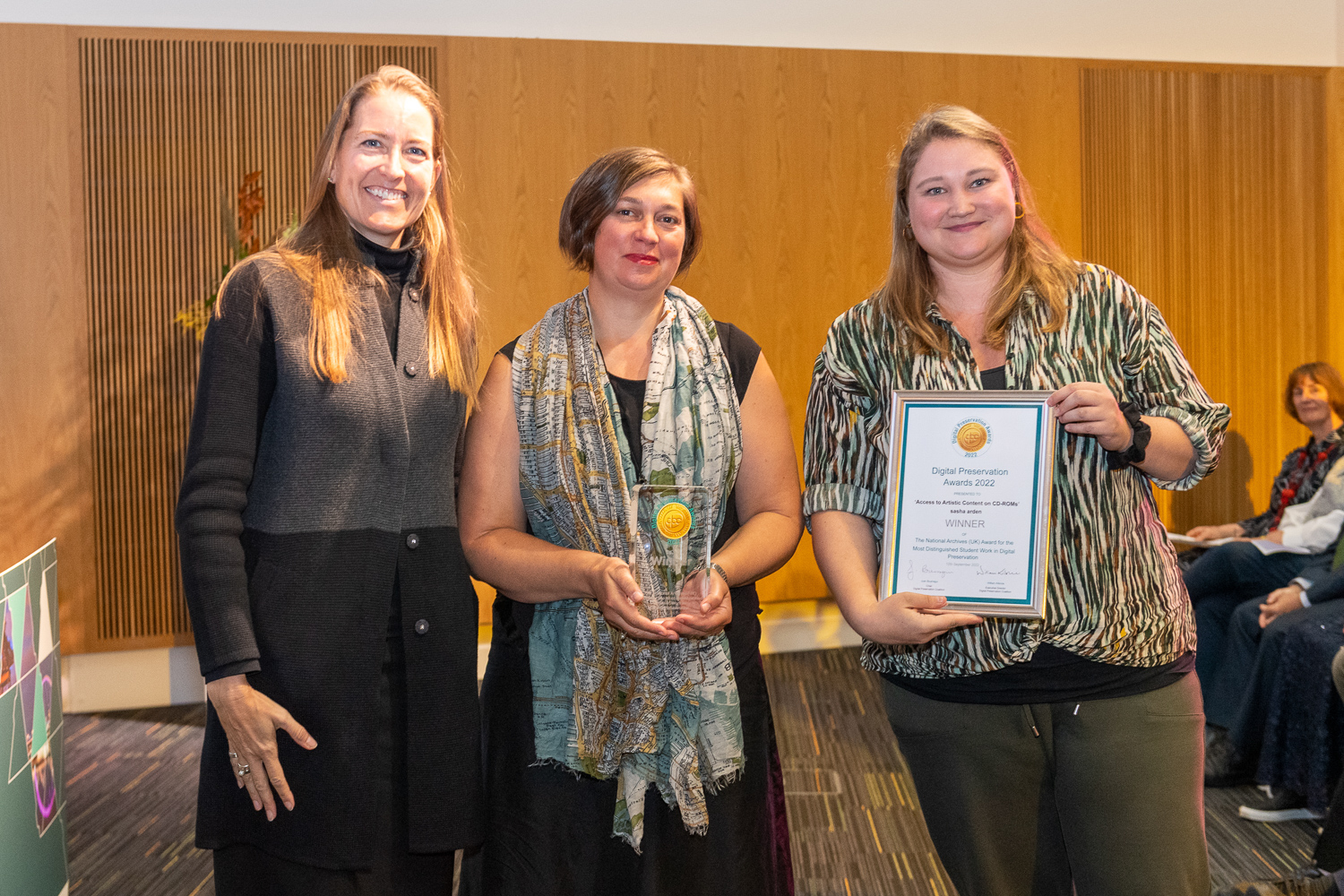 |
2022 Winner of the The National Archives (UK) Award for the Most Distinguished Student Work in Digital Preservation
|
National Centre for Truth & Reconciliation Digital Preservation Program
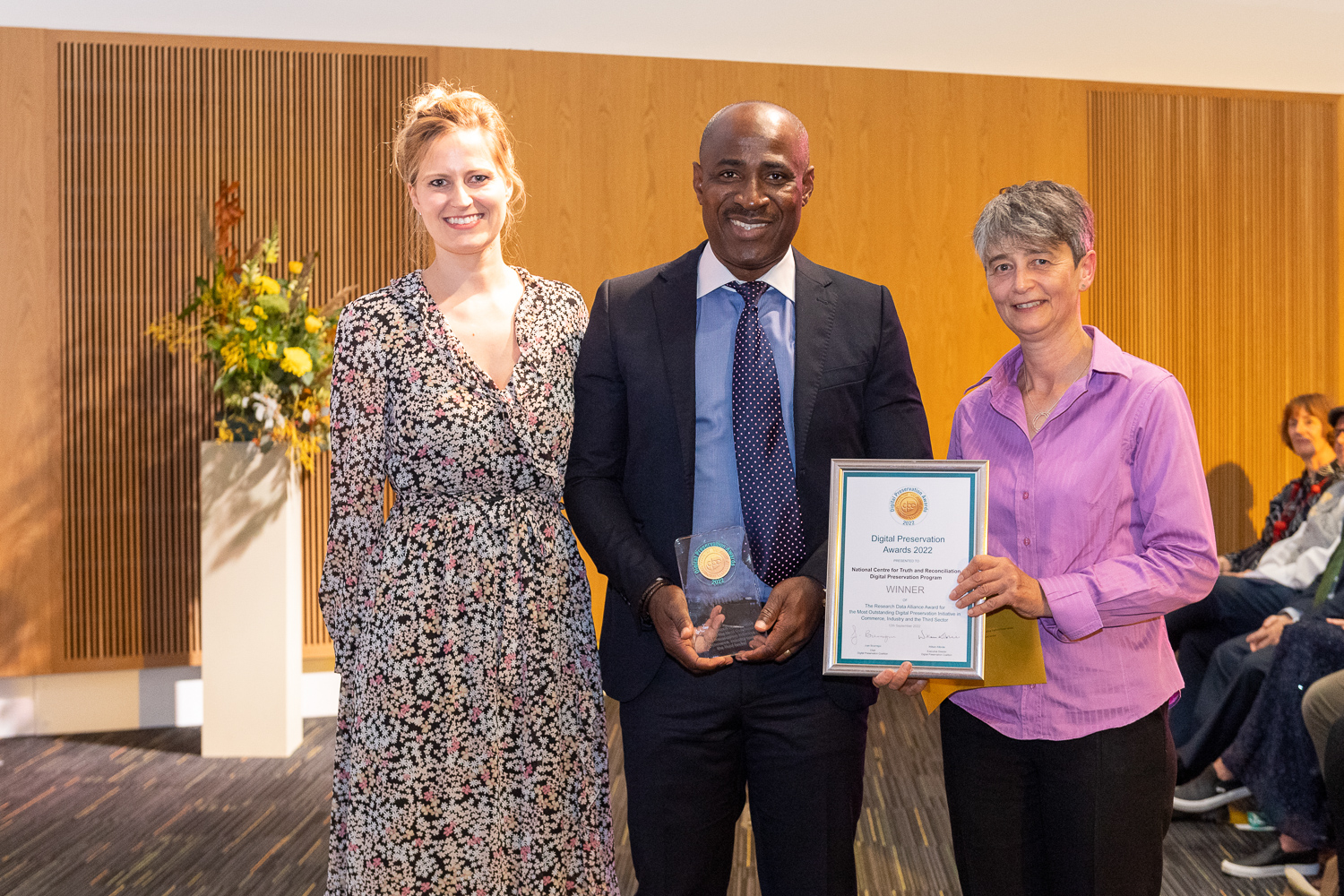 |
2022 Winner of the Research Data Alliance Award for the Most Outstanding Digital Preservation Initiative in Commerce, Industry and the Third Sector
|
Archiving Reproductive Health
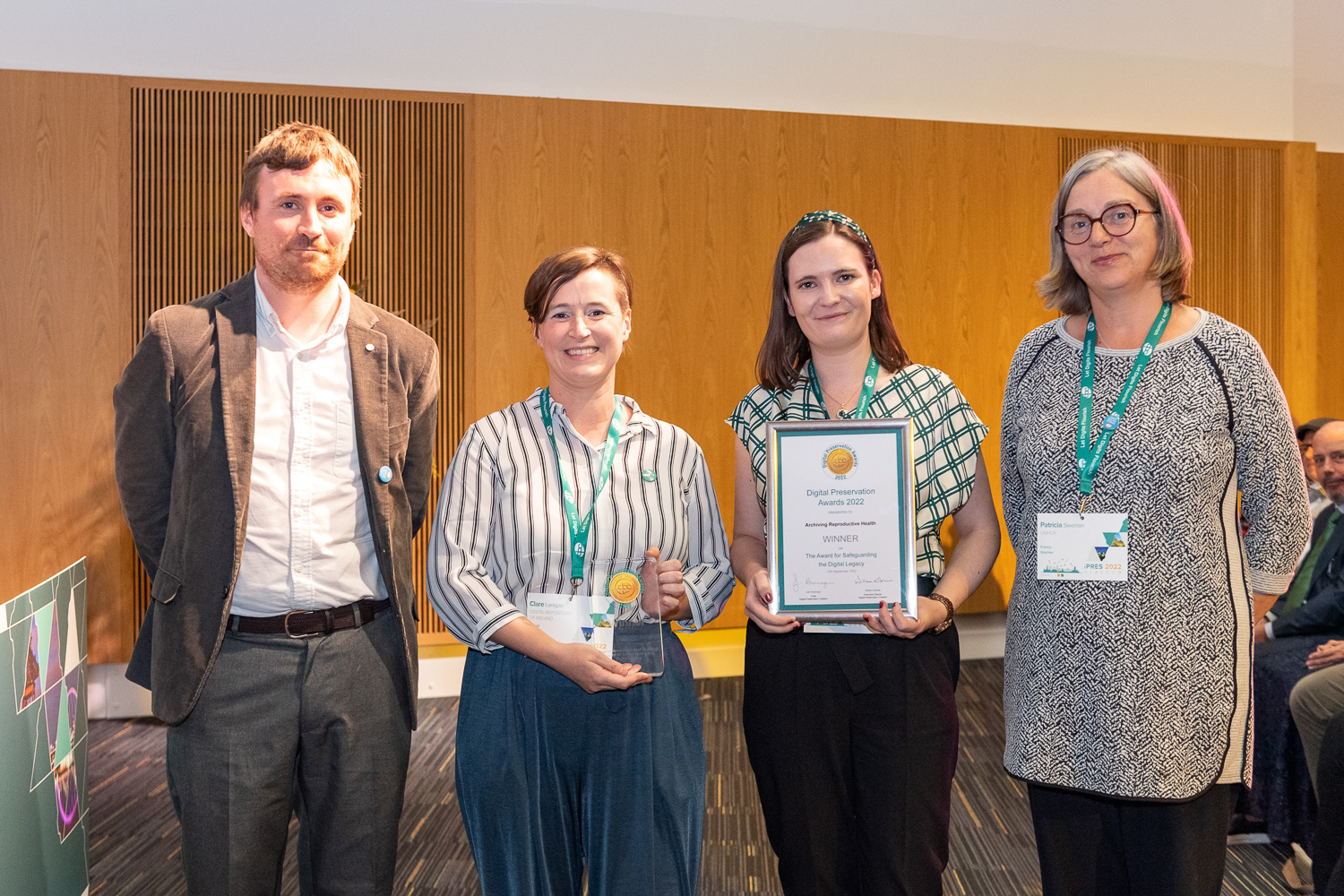 |
2022 winner of the Award for Safeguarding the Digital Legacy
|
PREMIS Data Dictionary and related resources
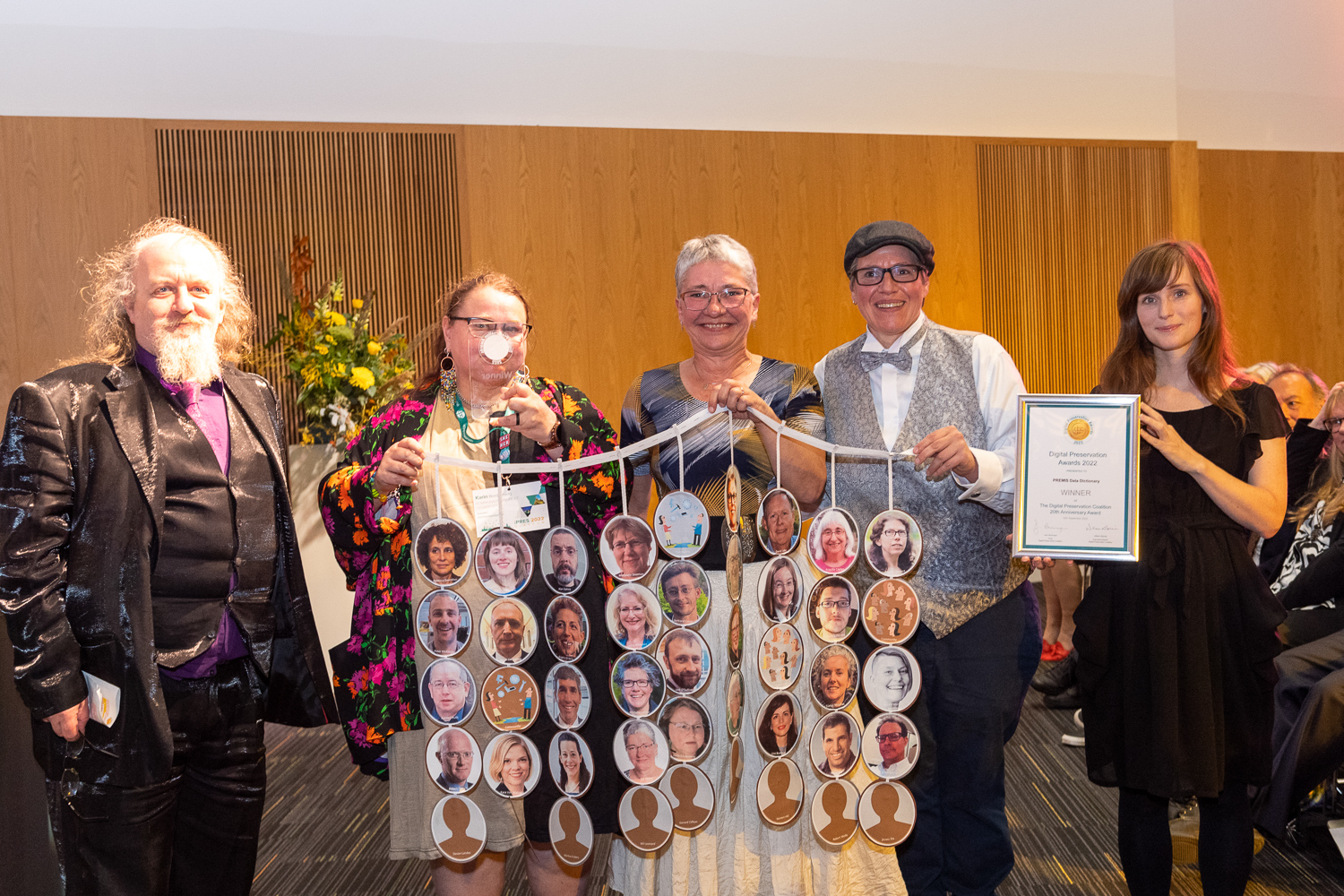 |
2022 winner of the DPC 20th Anniversary Award
|
Neil Beagrie, Adrian Brown, Dr. Denise de Vries, Nancy Y McGovern, Prof. Zhang Xiaolin
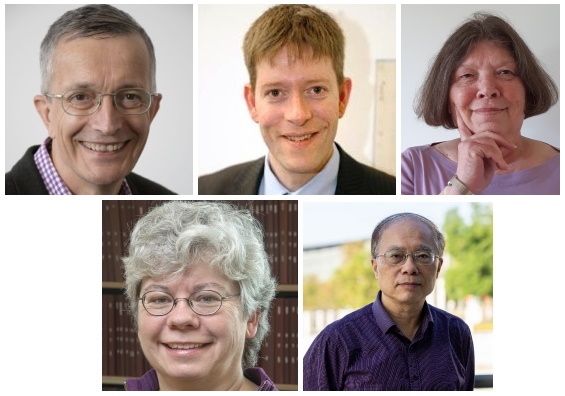 |
2022 Winners of the DPC Fellowship Award
|
Find out more about the Digital Preservation Awards 2022 Finalists
|
ICA Award for Collaboration and Co-operation:
|
Software Sustainability Institute Award for Research and Innovation:
|
|
|
|
|
|
|
Dutch Digital Heritage Network Award for Teaching and Communications:
|
The National Archives (UK) Award for the Most Distinguished Student Work:
|
|
|
|
|
|
|
Award for Safeguarding the Digital Legacy:
|
RDA Award for the Most Outstanding Digital Preservation Initiative in Commerce, Industry and the Third sector:
|
|
|
|
|
|
|
The DPC 20th Anniversary Award:
|
|
|
|
|
|
The DPC would like to thank our international panel of judges and all sponsors for their continued support in ensuring the Digital Preservation Awards can continue to recognise and celebrate achievements in the field of digital preservation.
|
Gabriela Andaur Gomez, |
Hilary Hanahoe, |
Roxana Maurer, |
Meg Phillips, |
|
Angela Beking, |
Natalie Harrower, |
Kari May, |
Sonia Ranade, |
|
Adam Bell, |
Haliza Jailani, |
April Miller, |
Karen Sampson, |
|
Neil Chue Hong, |
Neil Jefferies, |
Jenny Mitcham, |
Remco van Veenendaal, |
|
Neil Grindley, |
William Kilbride, |
Laura Molloy, |
Niklas Zimmer, |
|
Abbie Grotke, |
Kirsty Lingstadt, |
Sheila Morrissey |
|
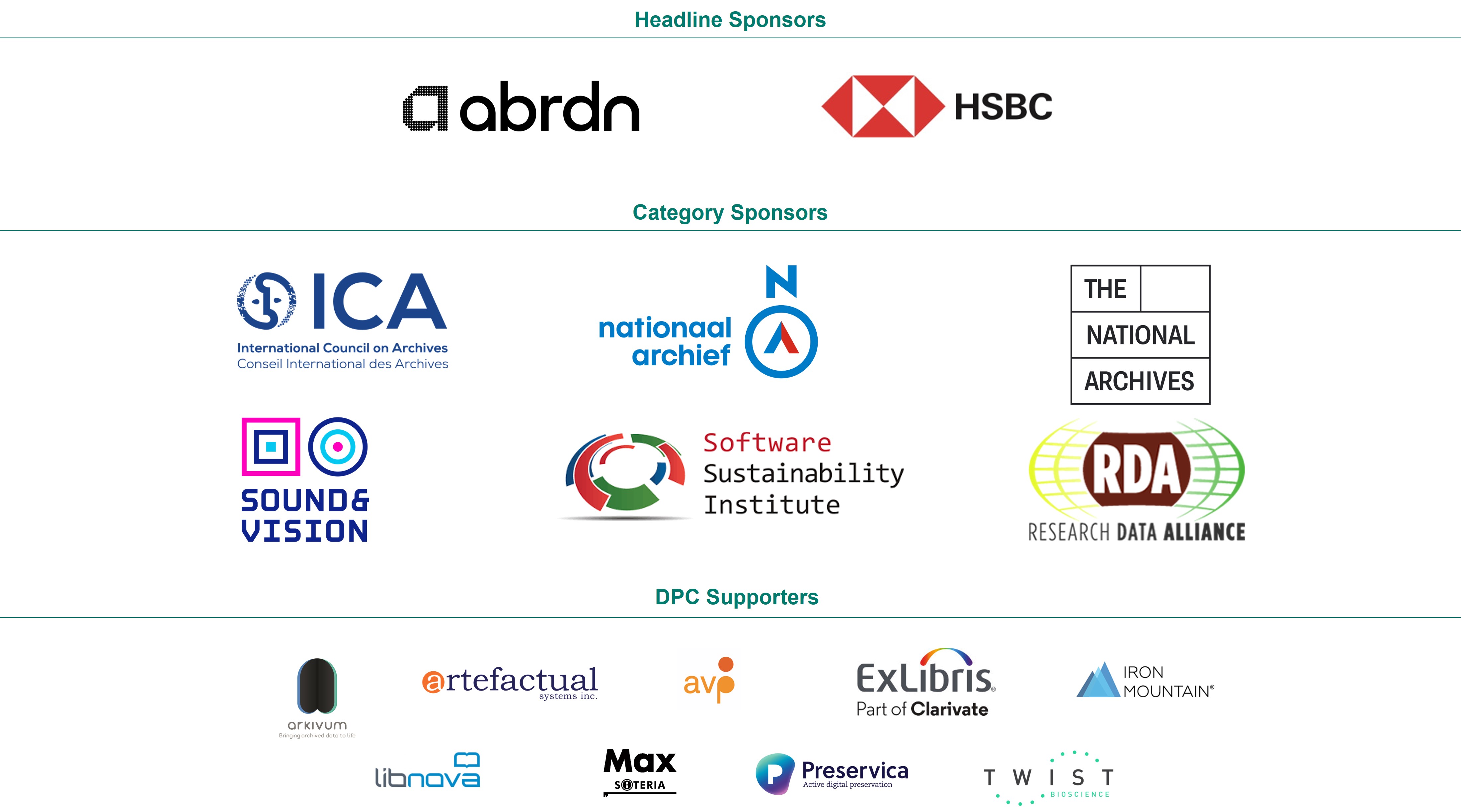
Digital Preservation Awards 2024
The search for the very best work in digital preservation will begin again this year with the Digital Preservation Awards 2024!

Organized by the Digital Preservation Coalition (DPC) every two years, the prestigious Digital Preservation Awards is the most prominent celebration of achievement for those people and organisations who have made significant contributions towards a sustainable future for our digital assets.
The exciting process will culminate in a presentation at the iPres 2024 Conference in Ghent on Monday 16th September 2024.
Visit this page again soon for more information about how to participate.
Digital Preservation Awards 2024: Sponsorship
We are very grateful to our sponsors and DPC Supporters for their generous contributions which enable the Digital Preservation Awards to take place:
Category Sponsors
-
The International Council on Archives, sponsors of the Award for Collaboration and Cooperation
-
The Digital Repository of Ireland, sponsors of the Award for Research and Innovation
-
The Dutch Digital Heritage Network (comprising Sound & Vision, National Archives of the Netherlands, KB The National Library of the Netherlands and the International Institute of Social History), sponsors of the Award for Teaching and Communications
-
The National Archives (UK), sponsors of the Award for Safeguarding the Digital Legacy
-
CLOCKSS, sponsors of the Award for the Most Distinguished Student Work
-
The Research Data Alliance, sponsors of the Award for the Most Outstanding Digital Preservation Initiative in Commerce, Industry and the Third Sector
Our DPC Supporters are Bronze Sponsors of the Digital Preservation Awards
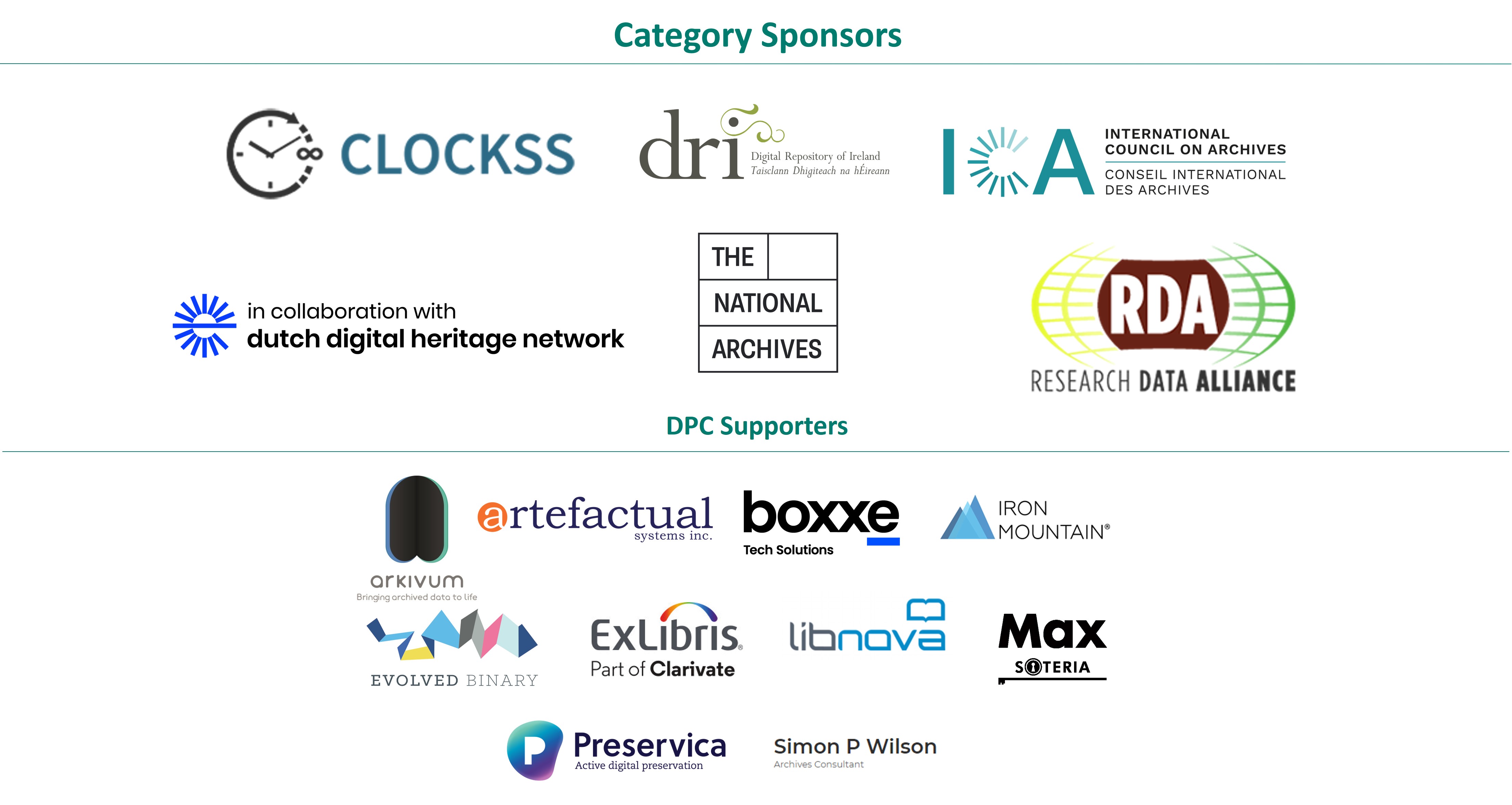
Sponsorship opportunities
If your organization would like to sponsor the Digital Preservation Awards please email sarah.middleton@dpconline.org.
Digital Preservation Awards 2024: Judges
The Digital Preservation Coalition is pleased to announce its international panel of expert judges for 2024:
Matthew Burgess
State Library of New South Wales
Matthew Burgess is the Lead Digital Archivist at the State Library of NSW, where he manages the preservation and accessibility of the Library's born-digital collections. Passionate about sharing knowledge and good practice in digital preservation, he leads the Digital Preservation Network for National and State Libraries Australasia (NSLA), represents NSLA as the Vice-Chair of the Digital Preservation Coalition’s Australasia and Asia Pacific Sub-Committee, and is a co-organiser for the Australasia Preserves digital preservation community of practice.
Gustavo Castener Marquardt
International Council on Archives
Gustavo Castañer is a professional archivist and records manager. He currently works as Unit Head of Information Resources and Services at the Asian Development Bank (Manila). He has worked previously in archives and records management of the United Nations, International Monetary Fund, European Commission, Council of the European Union and European External Action Service, as well as Spanish State Archives and the National Archives of Catalonia. He is especially interested in archives of international organizations, collection outreach, archival education and the use of archives to promote accountability and the defense of Human Rights. Within ICA, he has served previously as Chair of the Section of International Organizations and board member of the Section of Archives and Human Rights.
Fatima Darries
University of South Africa (UNISA)
Fatima leads and manages strategic Library initiatives in research data curation, digitisation of heritage and special collections, as well as metadata description of commercial and digital information resources at Unisa Library and Information Services. Her career has spanned both client and technical services in the Academic Library Sector and she continues to serve as South African country editor on E-LIS, the international archive for Library and related sciences, as well as on the Management and Government Subcommittee of the Digital Preservation Coalition.
Previously, Fatima served two terms of office on the Board of the National Library of South Africa, as well as serving the higher education sector with 10-year service as Board member on HERS SA, a network for women in higher education. She has served in various portfolios in the Library and Information Association of South Africa (LIASA).
Mihaiela Donisa
Bank for International Settlements
Mihaiela is a Records and Archives Expert at the Bank for International Settlements (BIS) since 2019, leading projects on digitisation, access and digital preservation of the institutions' collections. The BIS is an international organisaiton established in 1930 and its mission is to support central banks' pursuit of monetary and financial stability through international cooperation, and to act as a bank for central banks.
Mihaiela holds a MA in Archives and Records Management from UCL and has previously worked in archives and records management roles for European Bank for Reconstruction and Development, BBC and the European Medicines Agency.
Lisa Griffith
Digital Repository of Ireland (DRI)
Lisa Griffith is Director at the DRI. During her seven years at the DRI she also worked as Membership Manager and Programme Manager. Lisa helped to created DRI’s Community Archive scheme, launched in 2018. She has a strong interest in Community Archives and ensuring digital infrastructures are accessible to all. Lisa is actively involved in Ireland’s National Open Research Forum (NORF), sitting on their Steering Group, Grants Oversight Committee and chairing the National PID Taskforce. She holds a PhD in History and came to the DRI from roles in higher education and cultural heritage.
Gali Halevi
CLOCKSS
Gali Halevi is Collections Director for the CLOCKSS archive. She is a librarian and information specialist with over two decades of experience in the scientific publishing arena. She previously served as the Director of the Institute for Scientific Information at Clarivate. During her tenure, she led research initiatives and scientific collaborations. Before joining Clarivate, Gali held positions at the Icahn School of Medicine and the Mount Sinai Health System, where she advocated for open access principles and led faculty development activities as the associate dean for libraries and information sciences. At Reed-Elsevier, Gali managed academic customer engagement and research metrics, fostering relationships in academic and corporate sectors. Additionally, Gali has authored over 30 articles and book chapters in research metrics and evaluation.
Hilary Hanahoe
Research Data Alliance (RDA)
Hilary Hanahoe is the Secretary General of the global Research Data Alliance (RDA), an international, non-profit, volunteer organisation addressing the need for open and interoperable sharing and re-use of research data and building the social, technical and cross-disciplinary links to enable such sharing and re-use on a global scale. Currently, RDA has a community of over 12,500 individual data professionals from 145 countries collaborating on different open science and open data activities, operating under six fundamental guiding principles of openness, consensus, harmonisation, community-driven, inclusivity, not for profit and technology neutrality. Hilary is responsible for the financial and organisational sustainability of RDA on an international level and is the RDA Foundation CEO. She is passionate about the work of the Research Data Alliance and its vibrant, volunteer community working to enable the open sharing and reuse of data across the globe
Haliza Jailani
National Library Board Singapore
Previously responsible for the digital infrastructure programme at the National Library Board (NLB) of Singapore, Haliza worked on digital preservation early in 2008 implementing Ex Libris’ Rosetta and operationalising digital preservation processes. She is currently Deputy Director of Resource Discovery & Management in NLB, overseeing a team of librarians responsible for cataloguing and knowledge organisation systems, including metadata for digital preservation and linked data for discovery.
William Kilbride
Digital Preservation Coalition (DPC)
Executive Director for the DPC, William is the Acting Overall Chair of the Judging Panel. In his current role at the head of the DPC, he provides training and support to members as well as supporting the digital preservation community through advocacy work and enabling strategic partnerships. William is a prolific writer and speaker on the subject of digital preservation and has many years’ experience in the field, having previously held senior positions at Glasgow Museums and the Archaeology Data Service.
Nicola Laurent
Australian Society of Archivists
Nicola Laurent is the Senior Project Archivist on the Find & Connect web resource at the University of Melbourne. Nicola is the President of the Australian Society of Archivists, the International Council on Archives' New Professionals Programme Coordinator and a member of the National Archives of Australia’s Advisory Council. She is also a PhD candidate in the School of Social Work at the University of Melbourne undertaking research into the prevalence and impact of trauma in archives.
Thomas Ledoux
Bibliothèque nationale de France (BnF)
Thomas is the coordinator of digital production at the Bibliothèque nationale de France / National Library of France (BnF), where he has work as a software engineer for over 25 years. He has always been interested in digital objects, ranging from access on public workstations to his involvement in the BnF's Scalable Preservation & Archiving Repository (SPAR). He regularly collaborates on various open source software, such as Jhove or Archifiltre.
Kirsty Lingstadt
University of York
Kirsty is Director of Library, Archives and Learning Services, University of York. She plays a key role in delivering digital services within the library, with a key focus on Discovery of Collections online. This includes digitization of collections, digital preservation and also providing tools and services for digital scholarship.
Roxana Maurer
Bibliothèque Nationale du Luxembourg
Roxana comes to her role of Digital Preservation Coordinator for the Bibliothèque Nationale du Luxembourg (BnL) with considerable expertise and experience in Information Technology. In this role, she manages the digital archive, preserving for the long-term the National Library’s digitized and born-digital collections, as well as being as being a strong advocate for digital preservation both within and beyond the institution. Roxana plays a pivotal role in the persist.lu service, which assigns and maintains persistent identifiers based on ARK for the library's collections and offers this service to other interested institutions based in Luxembourg. In this capacity, Roxana is also an active member of ARK Alliance’s Technical Working Group. Additionally, Roxana serves on the Executive Board of the DPC as a Director for Research and Chair for the Good Practice Sub-Committee.
April Miller
World Bank Group
A graduate of the University of British Columbia’s Masters of Archives Studies program, April has worked in the field of archives and records management since 2000. This includes working as a Government Records Archivist at the National Archives of Canada, and now as the Manager for the programs, services and staff of the World Bank Group Archives & Records unit (ITSAR). Established in 1945, the World Bank Group is an international organization whose aim is to reduce poverty and promote shared prosperity around the world, and whose archival holdings illuminate the Bank’s engagement with its member countries to promote economic development. April has had the benefit of working through all records management and archives functions at the Bank, and delights in leading a group of dedicated professionals into our digital preservation endeavour.
Jenny Mitcham
DPC
Jenny began her career getting muddy and wet on archaeological digs so rapidly moved to working in an office with computers. This is how she got into digital preservation. After working for 15 years as a digital archivist at the University of York, she is now Head of Good Practice and Standards at the Digital Preservation Coalition where she has been supporting members with various strategic and practical challenges, and developed the DPC's Rapid Assessment Model (RAM). She also works closely with the UK Nuclear Decommissioning Authority.
Jo Ana Morfin
Memórica - Archivo General de la Nación
Jo Ana is a conservator of time-based media and works in the field of digital heritage. Her research focuses on the challenges in preserving contemporary cultural and social legacies rooted in ephemera and obsolete technologies. She works with cultural organizations and small communities of practice to implement best practices for digital preservation.
Sonia Ranade
The National Archives UK
Dr Sonia Ranade is Head of Digital Archiving at The National Archives (UK), with responsibility for digital services to records creators in government (for selection and transfer), preservation of the digital Public Record and access to born digital records. Her research interests include probabilistic approaches to archival description, digital preservation risk and developing new access routes for digital archives. Sonia holds a PhD in Information Science.
Arif Shaon
Qatar National Library
Arif Shaon is the Head of Digital Curation, Preservation, and Access at Qatar National Library, where he leads all activities related to long-term digital curation and preservation of the library’s digital collections. He has also held key positions at UNSW Library, University of New South Wales, Australia, and the Science and Technology Facilities Council, UK, where he played leading roles in software development and research projects in digital preservation and curation, and research data management.
Barbara Sierman
Barbara Sierman worked from 2005 to 2020 as the digital preservation manager at the Research Department of the KB National Library of the Netherlands. She was active on the Board of the Open Preservation Foundation and the Steering Committee of the IIPC. In 2018, she was awarded the Digital Preservation Coalition Fellowship for her contribution to the field of digital preservation. After her retirement, she founded DigitalPreservation.nl and worked as a consultant on digital preservation topics for various clients such as OPF, NANETH, CTS, and NDE. Currently, she is preparing a publication about the origins of the digital preservation profession.
Marjolein Steeman
Netwerk Digitaal Erfgoed / Beeld en Geluid
Marjolein works on projects in the area of preservation and metadata, developing and implementing preservation plans for new formats and archive services. She has worked worked at Beeld en Geluid / Sound & Vision for over 10 years. She studied information science at VU University Amsterdam and worked for years as an expert in data analysis and data management. Among other things, she has worked to secure various catalogs that came to Sound & Vision via merger partners or depositors. From 2017, Marjolein is part of the Verkennen Department, where she is responsible for the preservation policy of Sound & Vision. She is also a member of the Editorial Committee of PREMIS, the data standard for preservation metadata. In addition to the certification as a sustainable archive (CTS), the ISO certificate for information security (27001) also falls under her care.
Nathan Tallman
Academic Preservation Trust
Nathan Tallman is Executive Director of Academic Preservation Trust where he articulates a vision and executes strategic management for a community-owned distributed digital preservation service. He provides operational oversight of APTrust operations, including the development of plans and processes for the lifecycle of deposited content and the integration of digital preservation processes at existing and prospective APTrust member institutions. Previously, Nathan served as Digital Preservation Librarian and Penn State University and Digital Content Strategist at the University of Cincinnati.
Melissa Terras
University of Edinburgh
Melissa Terras is Professor of Digital Cultural Heritage within Design Informatics at the University of Edinburgh, UK. Her research contributions are in the area of digitisation of cultural heritage, covering three main areas: advanced digitisation techniques and approaches; understanding large-scale digitisation in the cultural heritage sector and how it can be best deployed for and by users as well as by institutions; and utilising the results of digitisation to undertake novel research and innovative projects in the arts and humanities. Recently, she has been working on the use of advanced technology in the cultural and creative industries, particularly how we can support innovation in this area. Melissa is Director of Creative Informatics, the Edinburgh based AHRC Creative Cluster (2018-2024), and a founding Director of Transkribus, the AI-powered platform for text recognition of historical documents. She is the University of Edinburgh Lead for CoSTAR (UK Government’s Convergent Screen Technologies and performance in Realtime) programme (2023-29).
Heather Tompkins
Library and Archives Canada / Bibliothèque et Archives Canada
Heather Tompkins is Senior Project Officer in the Digital Collections and Operations Division at Library and Archives Canada (LAC) where she has been working on the digital preservation of archival records for 16 years. Her work includes strategic advice and guidance on the transfer and processing of digital records, policy development and the establishment of LAC’s Pre-Ingest procedures. She recently completed a three-year stint on the DPC’s Good Practice subcommittee and is looking forward contributing to the wider digital preservation community as a Judge for the 2024 awards.
Jessica Venlet
National Digital Stewardship Alliance / University of North Carolina at Chapel Hill
Jessica Venlet works as the Assistant University Archivist for Digital Records and Records Management at the University of North Carolina at Chapel Hill Libraries. In this role, she is responsible for a variety of things related to both records management and digital preservation. In particular, she leads the processing and management of born-digital archival materials.
Jaye Weatherburn
University of Melbourne
Jaye Weatherburn is the Program Manager, Digital Preservation at the University of Melbourne, coordinating ongoing development for digital preservation and stewardship activities. Since 2018 she has developed and coordinated the regional digital preservation community of practice Australasia Preserves and previously led the pilot development for the international Digital Preservation Coalition’s Australasian activities throughout 2020-2021, aiming to further enhance digital preservation awareness and practice for the Australasian community.
Digital Preservation Awards 2024: Timetable
Entrants for the Digital Preservation Awards submitted nominations by 0800 (UTC) on Monday 22 April 2024 (see ‘How to Enter' for details). Nominations are evaluated, and finalists decided by the Digital Preservation Judging Panel Meeting in May 2024.
Once announced, finalists will then be required to do the following:
-
Submit a 3-minute lightning video outlining the key elements of the initiative. More details will be provided at this stage.
-
With the exception of the Student Award, attend an online interview with the Judging Panel week commencing 15th July 2024, explaining the importance of the initiative the field of digital preservation.
-
Provide good quality visual material – at least three hi-res jpeg images (e.g., project team, location shots, screen shots, products) – of the project to be used in publicity material relating to the Award and/or the Awards ceremony.
Only finalists will be asked for full details of their projects.
The following gives an outline of key dates. Dates will be finalized and agreed at the earliest opportunity.
|
6 March 2024 |
Launch of the Digital Preservation Awards 2024 |
|
22 March 2024 |
Second call for nominations |
|
15 April 2024 |
Final call for nominations |
|
22 April 2024 |
Awards close, nominations received, first sift check and distributed to judges |
|
Week commencing 20 May 2024 |
First Judging Panel (Shortlisting) |
|
11 June 2024 |
Finalists announced and invited to presentation |
|
14 June 2024 |
Online voting for finalists opens |
|
12 July 2024 |
Online voting closes |
|
Week commencing 15 July 2024 |
Second Judging Panel (presentations and interviews with finalists) |
|
16 September 2024 |
Awards presented at iPRES 2024 |
We are very grateful to our sponsors and DPC Supporters for their generous contributions which enable the Digital Preservation Awards to take place:

If your organization would like to sponsor the Digital Preservation Awards please email sarah.middleton@dpconline.org.
Digital Preservation Awards 2024: Eligibility and Frequently Asked Questions (FAQs)
Scope
-
The Judges will assume a broad definition of digital preservation: projects which describe themselves with specialist terms like ‘conservation’, ‘continuity’, ‘curation’, ‘legacy’, ‘permanent accessibility’, ‘sustainment’ or ‘sustainability’ will be eligible so long as they can demonstrate that they are working towards a sustainable future for our digital assets. Typically, digitization projects will not be eligible unless they offer a specific deliverable that will improve long term access to the digital estate. The Judges’ decision will be final, and no discussion will be entered into.
Deadline
-
There will be no extensions to the deadline.
Who can apply?
-
The awards are open to all. They seek to include entries from all organization types, across all sectors – public, private, for-profit, and non-profit and nominees do not need to be members of the DPC. The awards are international in scope and the project may have been carried out anywhere in the world; Judges will be looking to see how results and lessons learned are being shared with the wider digital preservation community so that they may also learn from the efforts undertaken. Nominations must be supported by senior management within your institution and nominations based on an external grant or commission should be supported by the grant giving agency or commissioning agent. Joint nominations are welcome from individuals or teams working in the public or private sectors, though a single point of contact must be agreed. There is no fee to enter the Digital Preservation Awards.
Do I need support from my manager?
-
Yes. The purpose of the Digital Preservation Awards is about raising awareness about digital preservation. By seeking the approval of management, we are asking you to undertake a modest amount of internal advocacy. For the purposes of the student award, the course convener or head of department is effectively the senior manager. Please address your letter of Support to the Judging Panel.
Why is there a timeframe?
-
The Awards are given for initiatives that were completed between 1st August 2022 and 31st July 2024 which is the period since the last Digital Preservation Awards, though Judges will be asked to use their discretion in the admittance of nominations which have been completed outside that period. NB: although the completion date should fall between the dates given, work may have begun at any date.
What can we submit?
-
Any project or initiative which has contributed towards a sustainable future for our digital assets. By ‘project’ we mean any sustained and unified effort that works towards a discrete and definitive outcome. This might include the development and delivery of innovative services or a single program of work. Pilot projects and full-scale projects can be submitted though nominees may wish to signal the relationship between them. Combinations of projects which happen to operate in the same sphere, but which have no structural linkage should be avoided and large or complex projects are encouraged to concentrate on specific deliverables which can be more readily understood. Small projects with modest outcomes are particularly encouraged to apply because impact will be assessed in proportion to the total resource expended.
Will you supply travel grants?
-
Where necessary we will provide a contribution towards travel for two participants to attend the ceremony. Nominees wishing to attend the iPres Conference must register for this separately, fees for attending the conference will not be covered.
Will you give feedback about our nomination?
-
Yes. All nominees get feedback from the Judges and shortlisted candidates will also receive feedback from their peers gathered from the public vote. The feedback will always be constructive, and the Judges encourage nominees to append these comments to their professional and organizational CVs.
Can we promote the fact that we have submitted a nomination, been shortlisted or have won an award?
-
Yes, we actively encourage you to do so. Where possible we will help you by providing supportive quotes or photography and will make time for press calls. The awards are run to engage the widest possible community in digital preservation, so we call on everyone interested in the awards to help raise their profile.
Can I ask your advice about completing my nomination form?
-
Yes, but we reserve the right to publish that advice on the FAQ section of the Digital Preservation Awards Website to ensure that any points of clarification are available to all. We will keep such advice anonymous. There is a comment function on the FAQ section of the website that you can use to ask questions.
Can I nominate someone for the DPC Fellowship Award?
-
DPC members will be formally invited to submit their nominations for the Fellowship Award with the online vote in June 2024. In response to this invitation, members should include their nominations as part of the voting card, or email their nominations to sarah.middleton@dpconline.org and we will collate a list for the Judges’ consideration in July. At this stage, the Judges will also submit their own nominations if not already made and a winner will be decided by the Judges only, from this list. The winner of the Fellowship Award will be decided upon by the Judging Panel from this list of names.
Did this page answer your question?
If not, email sarah.middleton@dpconline.org or add your question to the comments below...
Digital Preservation Awards 2016
Watch the ceremony
Watch the Digital Preservation Awards ceremony, filmed live on 30th November 2016 at the Wellcome Collection, London.
Meet the Winners
NCDD and NDE, ‘Constructing a network of nationwide facilities together.’
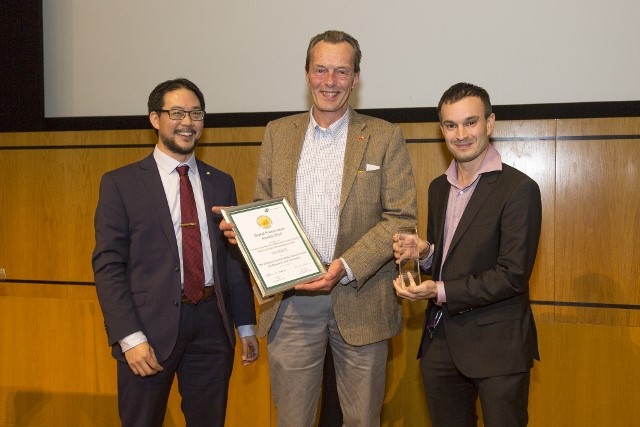 |
2016 Winner of the Software Sustainability Institute (SSI) Award for Research and Innovation,
|
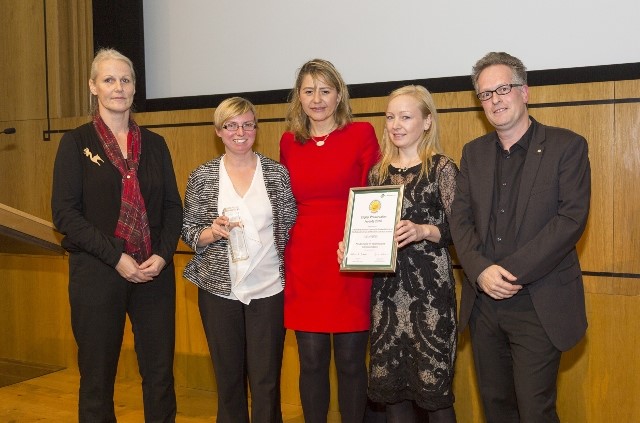 |
2016 Winner of the NCDD Award for Teaching and Communications,
|
Anthea Seles, University College London and ‘The Transferability of Trusted Digital Repository Standards to an East African context.
|
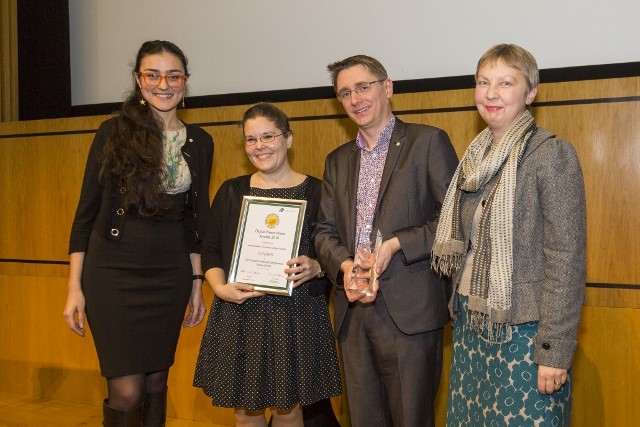 |
2016 Winner of the DPC Award for the Most Distinguished Student Work in Digital Preservation,
|
HSBC, ‘Global Digital Archive System (GDA)'
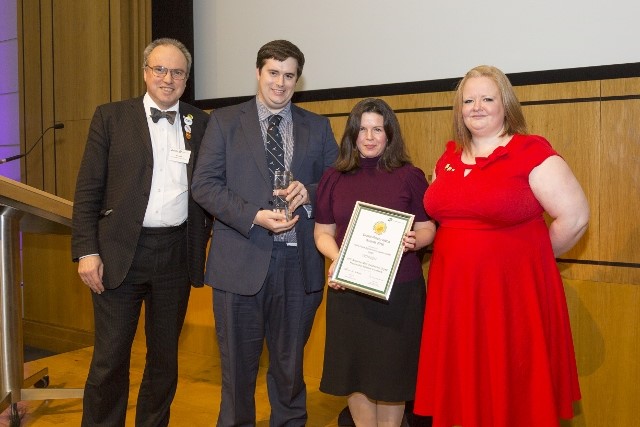 |
2016 Winner of the DPC Award for the Most Outstanding Digital Preservation Initiative in Industry,
|
Amsterdam Museum and Partners, ‘The Digital City revives: A case study of web archaeology.’
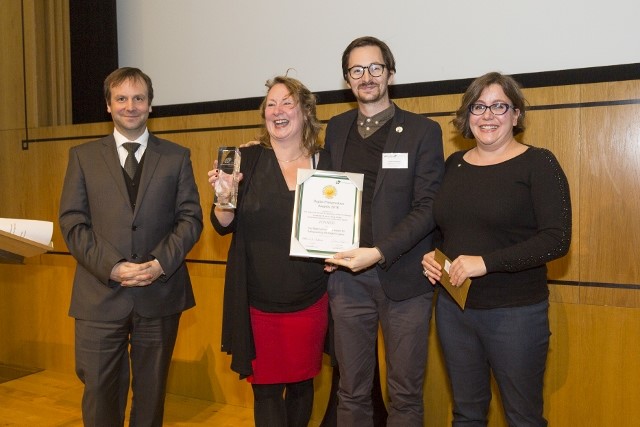 |
2016 Winner of the National Archives Award for Safeguarding the Digital Legacy,
|
Brewster Kahle, Internet Archive
|
|
2016 Winner of the DPC Fellowship Award,
|
Digital Preservation Awards 2016 Finalists
|
Software Sustainability Institute Award for Research and Innovation
|
NCDD Award for Teaching and Communications
|
|
DPC Award for the Most Distinguished Student Work in Digital Preservation
|
DPC Award for the Most Outstanding Digital Preservation Initiative in Industry
|
|
The National Archives Award for Safeguarding the Digital Legacy
|
The DPC extends grateful thanks to our international panel of Judges and all of our sponsors who made DPA2016 a possibility:
|
Adrian Brown, |
Louise Lawson, |
Sandra Collins, |
|
Daniela Duca, |
Manuela Speiser, |
Sharon McMeekin, |
|
Dave Tarrant, |
Marcel Ras, |
Steve Daly, |
|
Dave Thompson, |
Maureen Pennock, |
Tim Gollins, |
|
Joachim Jung, |
Neil Chue Hong, |
William Kilbride, |
|
John Sheridan, |
Paul Wheatley, |
|
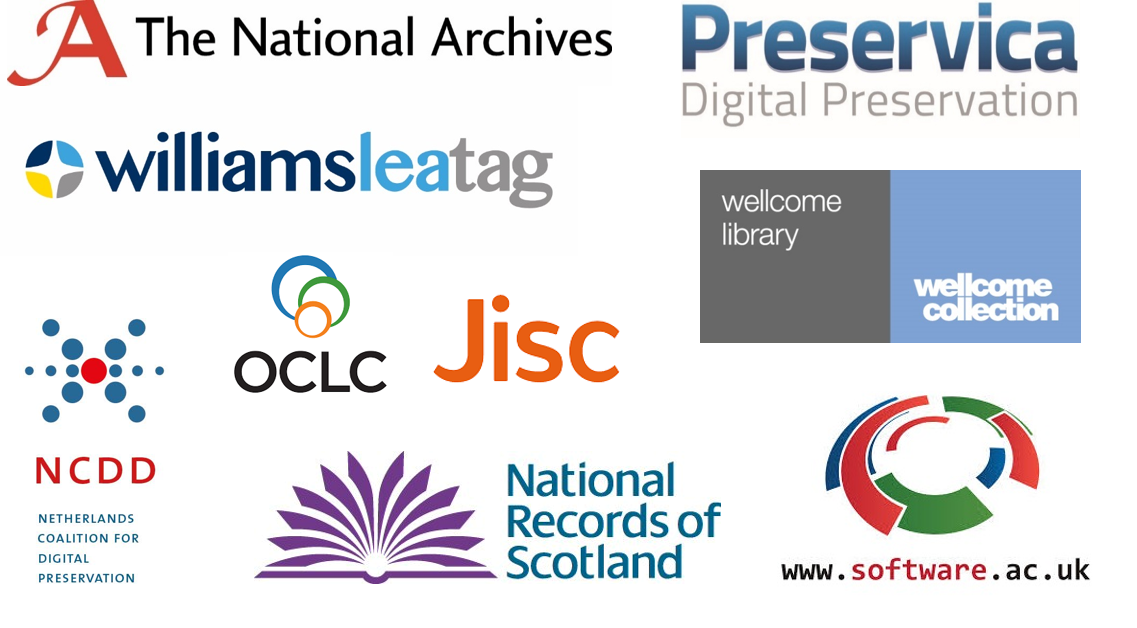
Digital Preservation Awards 2018
Watch the ceremony
Watch the Digital Preservation Awards ceremony, filmed live in November 2018 at the Amsterdam Museum in the Netherlands.
Meet the Winners
Stanford University Libraries, ePADD
|
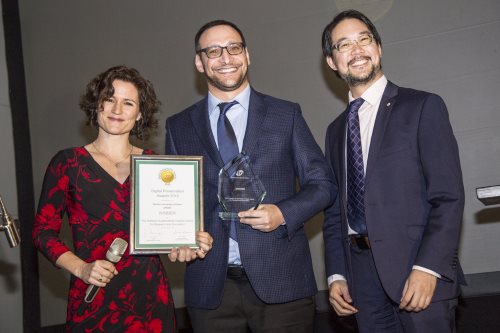 |
2018 Winner of the Software Sustainability Institute (SSI) Award for Research and Innovation
|
Jennifer Allen, Matthew Farrell, Shira Peltzman, Alice Prael and Dorothy Waugh; The Archivist’s Guide to Kryoflux
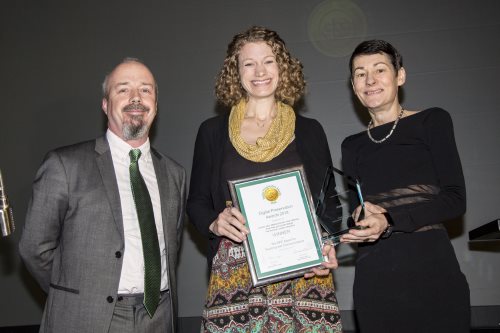 |
2018 Winner of the DPC Award for Teaching and Communications,
|
Anna Oates; University of Illinois at Urbana-Champaign
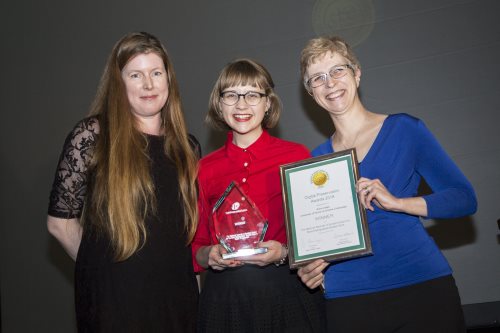 |
2018 Winner of the National Records of Scotland (NRS) Award for the Most Distinguished Student Work in Digital Preservation,
|
Crossrail and Transport for London; Archiving Crossrail
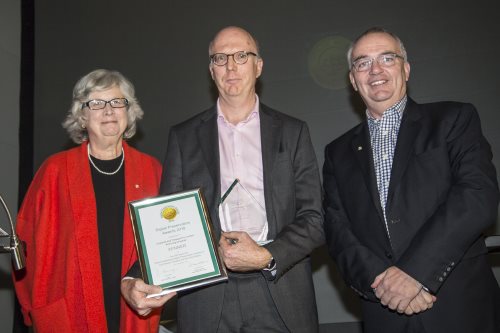 |
2018 Winner of the Open Data Institute (ODI) Award for the Most Outstanding Digital Preservation Initiative in Commerce, Industry and the Third Sector,
|
IFI Irish Film Archive; IFI Loopline Project
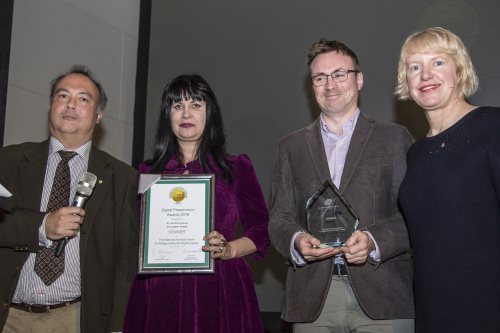 |
2018 Winner of the National Archives Award for Safeguarding the Digital Legacy, presented by Valerie Johnson, The National Archives and Neil JefferiesFrustrated by budget constraints & unresponsive commercial vendors the IFI Irish Film Archive was inspired by the FLOSS community to develop a suite of 55 open source scripts (IFIScripts) that support our digital preservation activities in a sustainable and efficient manner. Solving problems in-house has reduced our maintenance costs and vendor fees and allowed us to take control of our preservation workflows. Not only has IFIScripts helped us to fulfil our digital preservation remit within our limited staff and financial resources, but we sharing all our tools with the preservation community on Githib for others to use and adapt. We are currently completing our first end- to- end application of the IFI Scripts on a preservation projection for a collection of material from a leading Irish film production company called Loopline Films. Watch interview with Kasandra O'Connell and Kieran O'Leary Watch DPA2018 Winners Webinar on the IFI Irish Film Archive Loopline Project |
Barbara Sierman
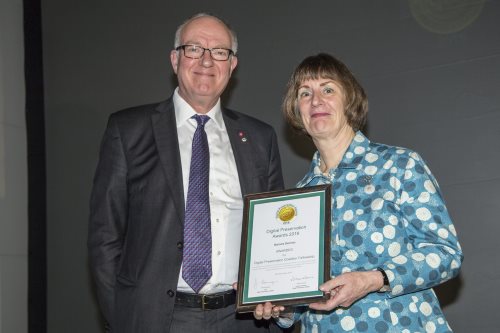 |
2018 Winner of the DPC Fellowship Award,
|
The Digital Preservation Awards 2018 Finalists
|
The Software Sustainability Institute Award for Research and Innovation
|
The DPC Award for Teaching and Communications
|
|
The National Records of Scotland Award for the Most Distinguished Student Work in Digital Preservation
|
The Open Data Institute Award for the Most Outstanding Digital Preservation Initiative in Commerce, Industry and the Third sector |
|
The National Archives Award for Safeguarding the Digital Legacy
In the category of 'Safeguarding the Digital Legacy' The judges also offered a special commendation to the GI Press Collection |
|
The DPC extends grateful thanks to our international panel of Judges and all of our sponsors who made the Digital Preservation Awards 2018 a possibility:
|
David Tarrant, |
Neil Chue Hong, |
Sheila Morrissey, |
|
John Sheridan, |
Neil Grindley, Jisc |
Steve Daly, BBC |
|
Karen Sampson, |
Neil Jefferies, |
Susan Reilly, |
|
Laura Molloy, |
Paul Wheatley, |
Tim Gollins, |
|
Marcel Ras, |
Sally McInnes, |
William Kilbride, |
|
Natalie Harrower, |
Sharon McMeekin, |
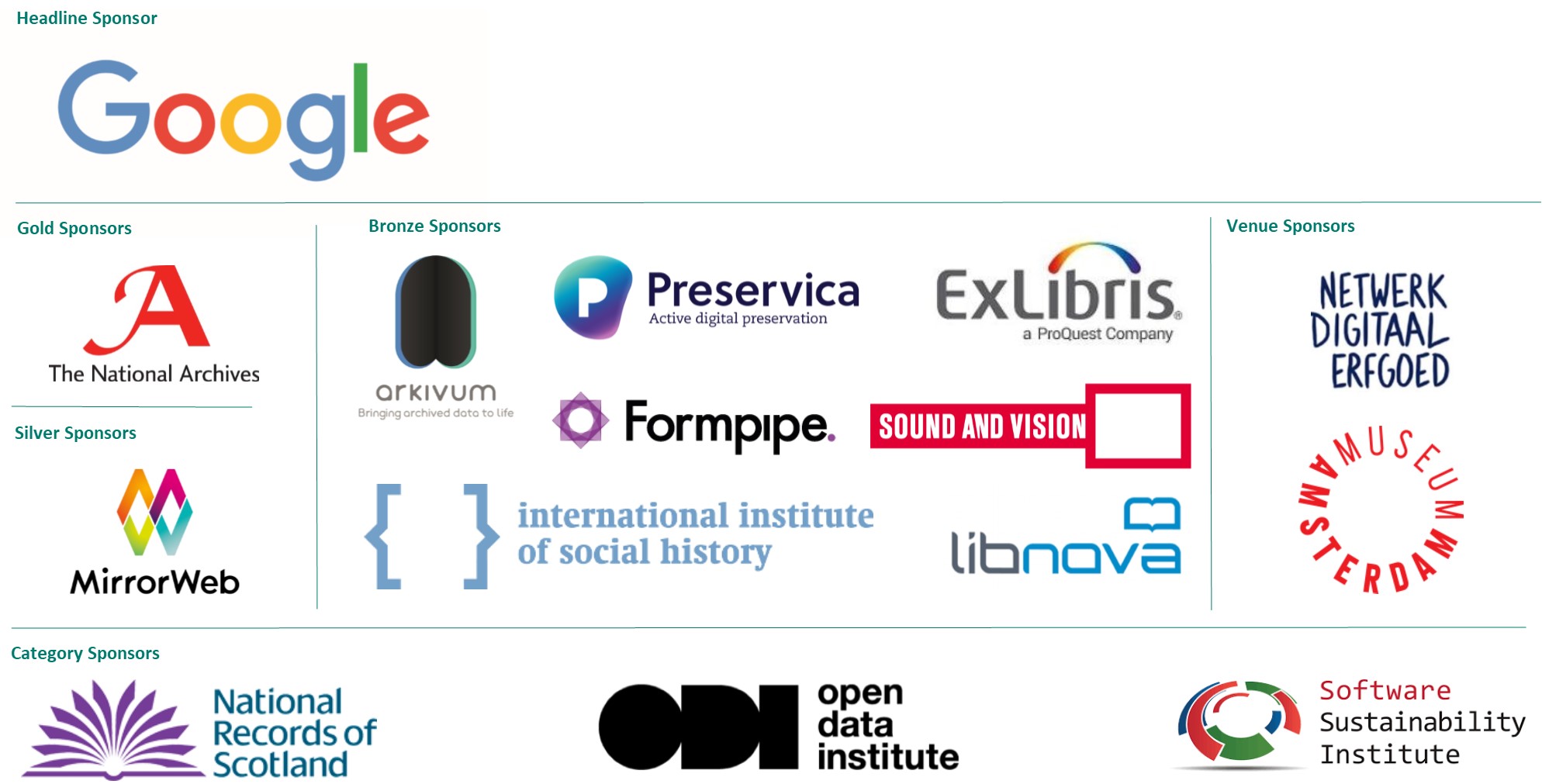
Digital Preservation Awards 2020
Watch the ceremony
Watch the Digital Preservation Awards ceremony, which took place online for World Digital Preservation Day on 5th November 2020.
Meet the Winners
NDSA Levels of Digital Preservation Revision Project
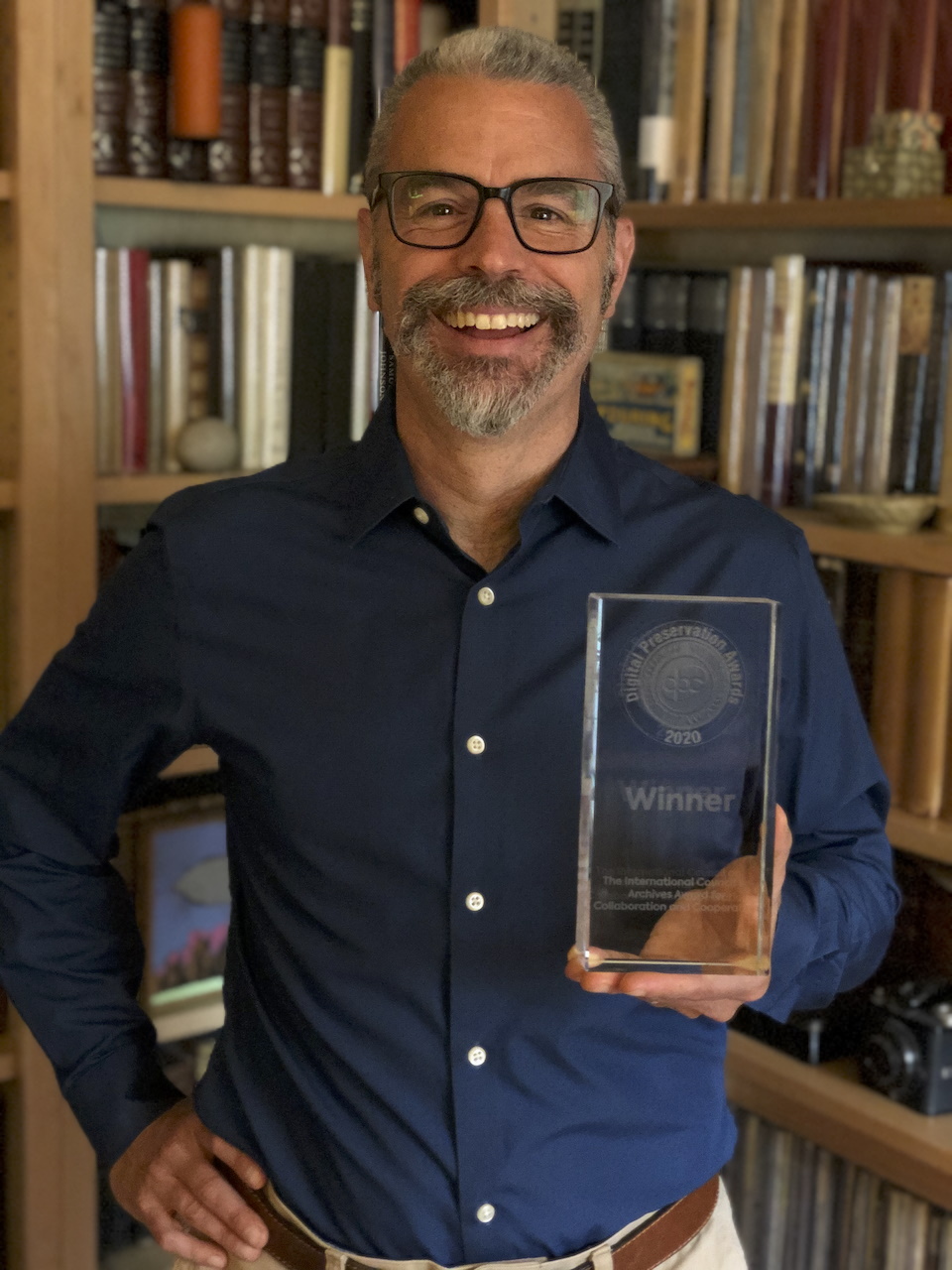
|
2020 Winner of the International Council on Archives Award for Collaboration and Cooperation
|
Levels of Born Digital Access
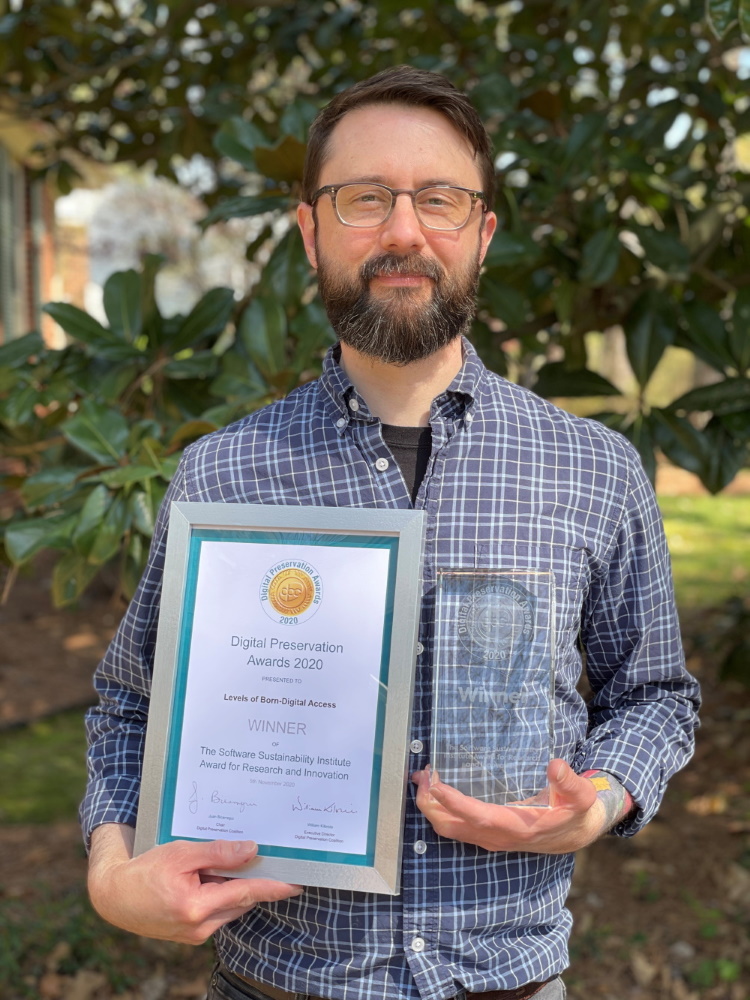
|
2020 Winner of the Software Sustainability Institute (SSI) Award for Research and Innovation
|
Digital Records Curation Programme
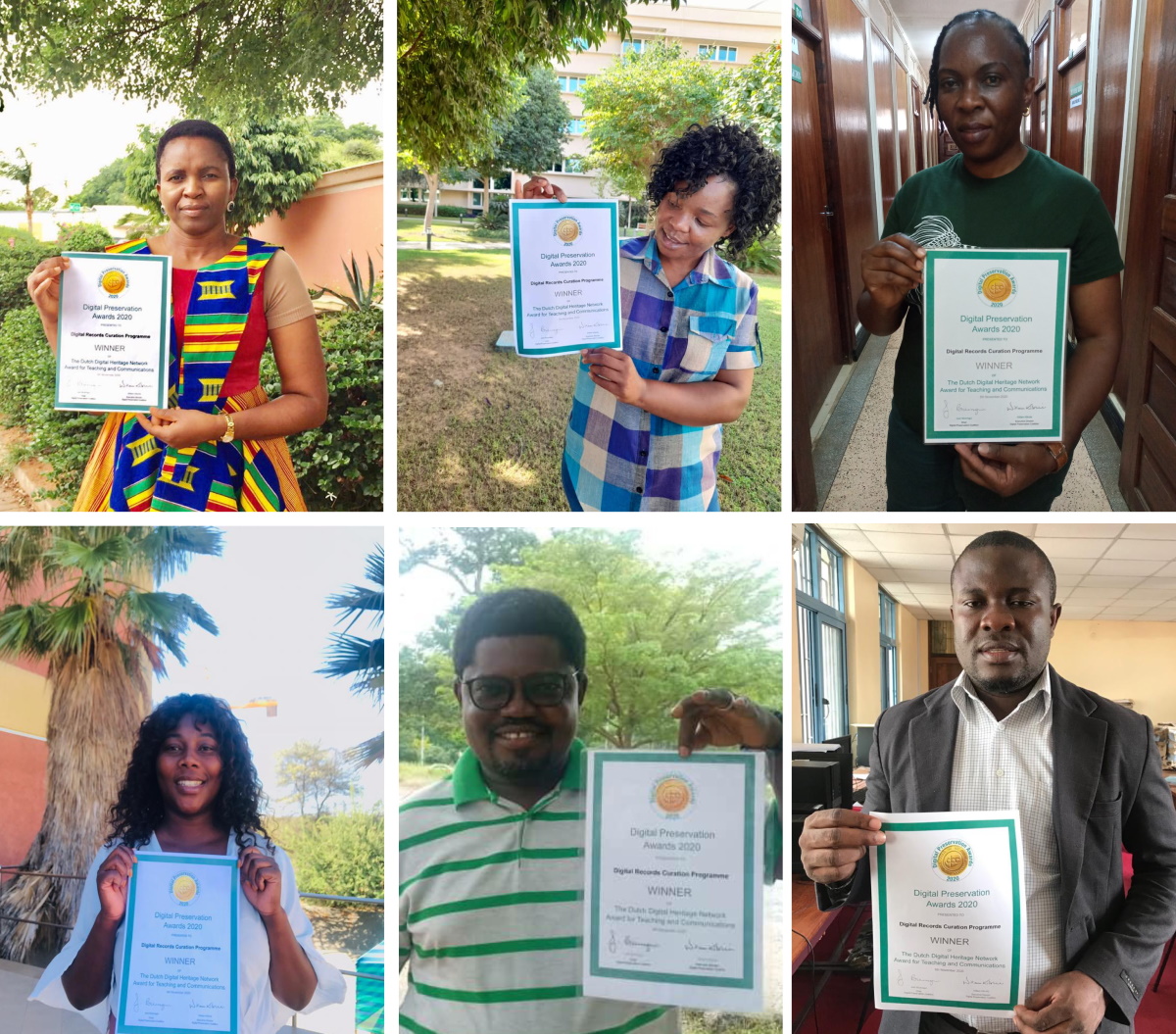
|
2020 Winner of the Dutch Digital Heritage Network Award for Teaching and Communications
|
Lotte Wijsman with ‘The Significant Properties of Spreadsheets: Stakeholder Analysis’
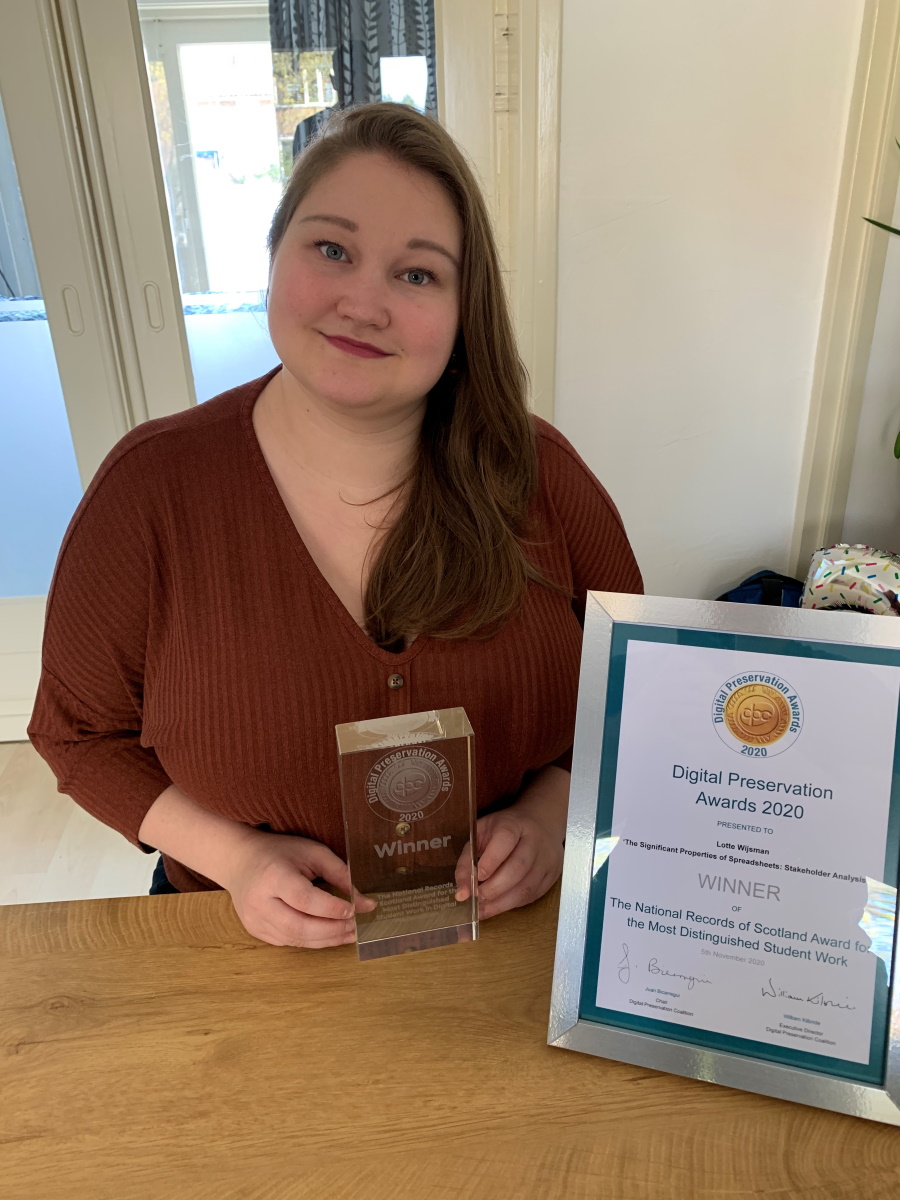
|
2020 Winner of the National Records of Scotland (NRS) Award for the Most Distinguished Student Work in Digital Preservation
|
UNHCR Records and Archives
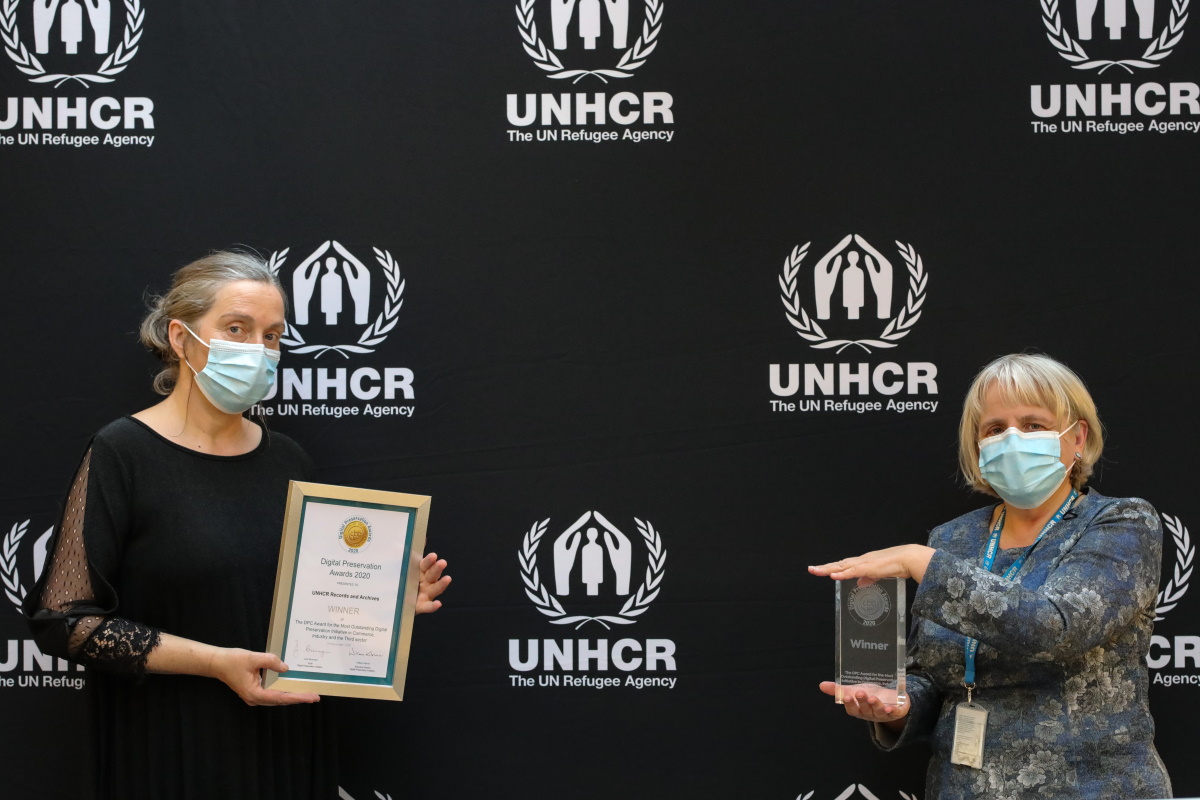
|
2020 Winner of the DPC Award for the Most Outstanding Digital Preservation Initiative in Commerce, Industry and the Third Sector
|
UK Web Archive: celebrating 15 years
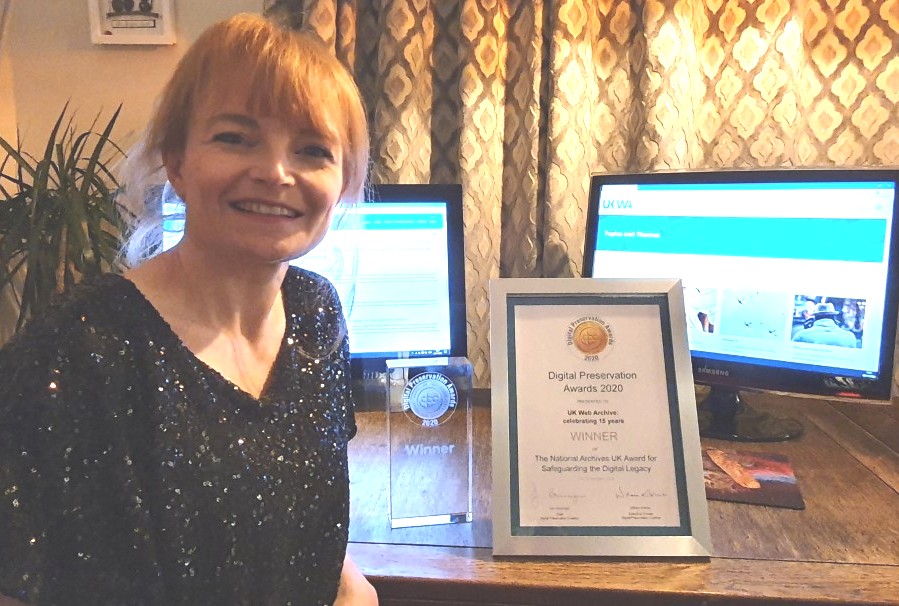
|
2020 Winner of The National Archives (UK) Award for Safeguarding the Digital Legacy
|
Micky Lindlar
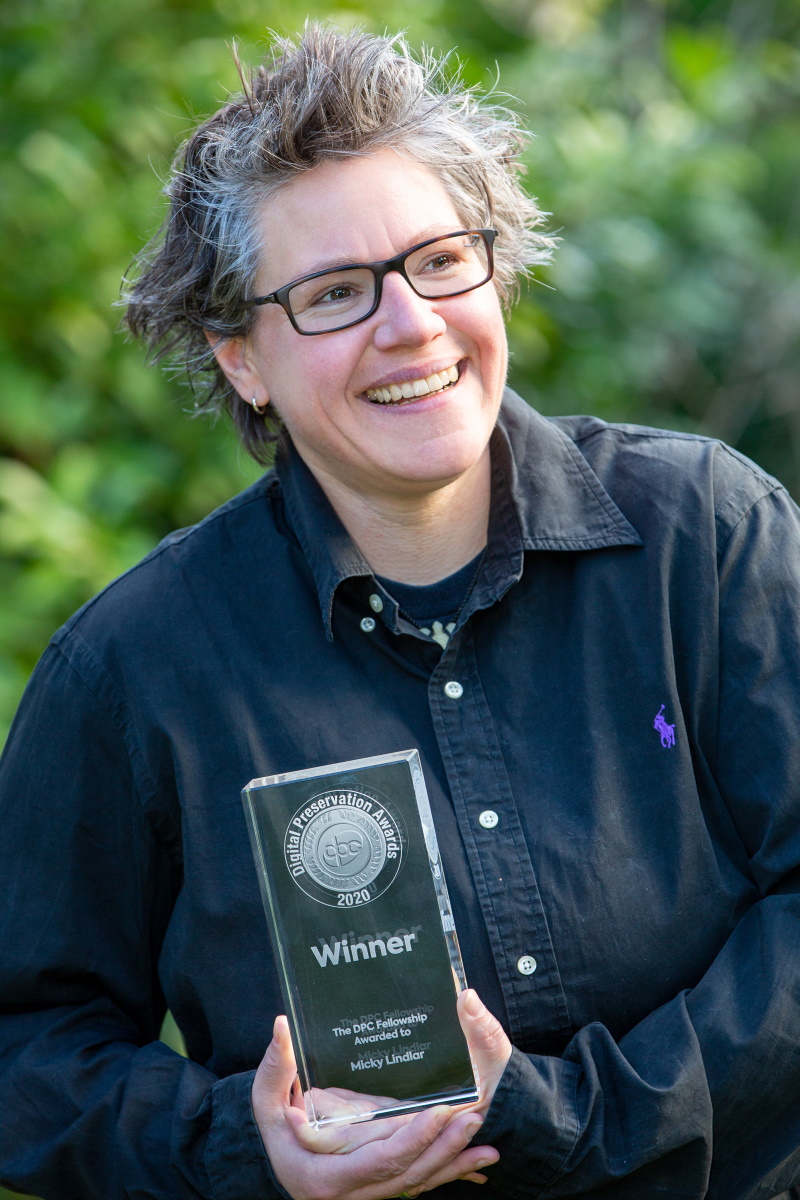 |
2020 The DPC Fellowship Award, presented by Richard Ovenden |
Find out about the Digital Preservation Awards 2020 Finalists
Drawing together the finalists' presentatations from the #WeMissiPRES event in September 2020, hear our Digital Preservation Awards judges as they introduce and reflect on the excellent, inspiring and innovative people and projects they have encountered throughout the awards process.
Watch and learn about each of our incredible finalists as they tell us more about their work.
The International Council on Archives Award for Collaboration and Cooperation
|
The Software Sustainability Institute Award for Research and Innovation
|
The Dutch Digital Heritage Network Award for Teaching and Communications
|
The National Records of Scotland Award for the Most Distinguished Student Work
|
The National Archives Award for Safeguarding the Digital Legacy
|
The DPC Award for the Most Outstanding Digital Preservation Initiative in Commerce, Industry and the Third sector
|
The Digital Preservation Awards are made possible by the expertise and support provided by our international panel of Judges, and funding from our sponsors.
|
Angela Beking, |
Abbie Grotke, |
Roxana Maurer, |
Sheila Morrissey |
|
Neil Chue Hong, |
Natalie Harrower, |
Sally McInnes, |
Marcel Ras, |
|
Susan Corrigall, |
Neil Jefferies, |
Sharon McMeekin, |
Karen Sampson, |
|
Joanna Fleming, |
William Kilbride, |
April Miller, |
Anthea Seles, |
|
Neil Grindley, Jisc |
Kirsty Lingstadt, |
Laura Molloy (Chair), |
John Sheridan, |
